STORY BY BENSON AFFUL









ISSUE 2 JULY - AUGUST EDITION Russia-African relations in the context of geopolitical changes 0123 456 7 89 10 1234 56 78 9 C O C O A M a x im i z i n g E x p l o r i n g o p t i o n s P R O DU C T I O N I N G H A N A G H C3 0 u s$3 0 A l a n le a d i n g a m b it i o u s tr a d e p o l i cy , si x y e a rs o n C r it i c a l v i e ws o n R u s si a ’ s p o l i cy t o wa r d s A f r i ca Ky e r e m at e n In-depth views on Russia's valuable contribution in a number of economic sectors including infrastructure development PAGE 46 ...can leaders prioritize and address food security challenges? Fee d i n g t h e hu n g ry i n A f r i c a Six years after the successful implementation PAGE 28
i nv es t m e n t T im e s o n l in e. c o m A N E W T HINKIN G c ov er sto ry
African Business

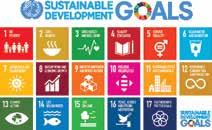
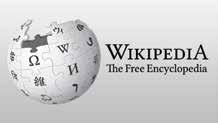









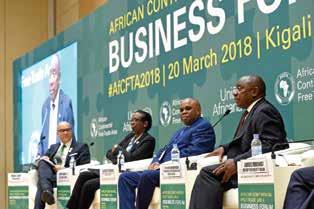
CONTENT Editor’s Message
Read More on Page 03 Over these years Russia has highly prioritized the military sphere in Africa. It shows clearly Russia's weak business engagement with Africa. Until now, we can’t point to completed Russian infrastructure
&
Read More on Page 61 Small and medium-sized businesses (SMEs), which are the backbone of the global economy...
Read More on Page 16 he project will position Mozambique as an energy hub in southern Africa. It will provide lower cost energy in the country and region, contribute to universal access to energy in the country by 2030 and support rapid industrialization... Cover Stories Read More on Page 28 TGhana is uniquely positioned to become the new commercial capital for Africa
HR Desk Read More on Page 18 ome employees who are under stress sometimes choose to absent themselves from work which negatively affect their performance at work
Read More on Page 70 The issues contributing to this gender gap are likely multi-fold, with reasons cited that woman can tend to have less leisure time than men, to an editing culture on Wikipedia that is not always conducive to newcomers... Local News Read More on Page 50 the livelihoods of Ghanaians, the sector is threatened by climate change and illegal mining popularly known as ‘galamsey’ Opinion & Analysis Read More on Page 31 As the world re-opens up and begins to recover from the deleterious effects of the pandemic, the SDGs have, become even more relevant as they present us with a credible pathway for a prosperous, inclusive, resilient and peaceful world Africa’Touted as the new dawn of Africa’s integration, this free trade area holds the potential to advance equitable development for all of its people. It addresses that challenge of small, fragmented markets, adds value to Africa’s abundant natural resources, provides boost to intra-African trade and ultimately Read More Page 02
Banking
Finance
Energy
The
Lifestyle
Tnent, one that offers limitless opportuni ties for regional integration and econom ic growth.
With thought-out integrations and the right support systems, it is the most sus tainable source of jobs and wealth creation that will drive the need improve ment in livelihoods of the populace aside fast-tracking the nation’s development.
The latest survey that’s been conducted on the single market by the Ghana Statis tical Service revealed that over 82percent of local businesses see the AfCFTA as a growth pole for their sustainability and business expansion.
Gradually the continent is gearing towards the official start physical trading and it is heartwarming to note that the facilitating agency is building the right linkages and supports to fast-track its smooth implementation.
Touted as the new dawn of Africa’s inte gration, this free trade area holds the potential to advance equitable develop ment for all of its people.
It addresses that challenge of small, frag mented markets, adds value to Africa’s abundant natural resources, provides boost to intra-African trade and ultimately

now.
We will need to have in place deliber ate and structured interventions and support systems for the critical core, specifically the exports community with is mostly comprised of small and wom en-led enterprises
PUBLIS HER: INVEST MENT TIM ES LTD PHONE 233 54 797 5487 ADDRESS PLOT 91 BAATSONA | SPINTEX - ACCRA MAIL INFO@INVESTMENTIMESONLINE.COM
EDITOR
BENSON AFFUL
editor@investmenttimesonline.com
African leaders cooperate with Russia to gain leading position on global arms market
 By Kestér Kenn Klomegâh
By Kestér Kenn Klomegâh
Chairing a meeting of the Commission for Military Technology Cooperation with
Foreign States, Russian President Vladimir Putin has called for renewed efforts, not only in pre serving but also in strengthening Russia's lead ing position on the global arms market, primari ly in the high-tech sector, amid tough competi tion.
"Our capabilities in the military technical sphere must be used to modernise and upgrade all our industries, to support our science and to create a powerful technological potential for the coun try’s dynamic development," Kremlin website officially reported.
Putin further called for reliance on the rich expe rience in this sphere and building up consistent ly military technology cooperation with foreign
states. Kremlin website further reported that Russia's global export of military products has been at a consistently high level, around $25 billion.
Russian manufacturers have the advantage of an unfailingly high quality of products, which have no analogue in their combat and technical characteristics. Russia values its reputation of being a conscientious and responsible participant in military technol ogy cooperation.
"We strictly observe international norms and principles in this area. We supply weapons and military equipment solely in the interests of security, defence and anti-terrorism efforts. In each case, we thoroughly assess the situation and try to predict the developments in the specific
investmenttimesonline.com 03 AFRICAN LEADERS COOPERATE WITH RUSSIA
region. There are no bilateral contracts ever targeted against third countries, against their security interests," he explained.
Putin suggested that "the changing condi tions in which we have to trade in military equipment require some adjustment of existing approaches and development of a new integrated strategy for the future."
Over the past years, strengthening mili tary-technical cooperation has been part of the foreign policy of the Russian Federation. Aside Asia and Latin America, Russia has signed bilateral military-technical coopera tion agreement nearly with all African coun tries.
Putin explained that Russia is ready to distribute advanced weaponry across the globe, particularly in Africa, Asia and Latin America. "Russia sincerely cherishes the historical strong, friendly, truly trusting ties with the states of Latin America, Asia, and Africa and is ready to offer its partners and allies the most modern types of weapons," he underscored this point in his speech.
Our monitoring indicates that traditional importers of Russian weapons from Africa include Algeria, Angola, Burkina Faso, Botswana, Egypt, Ethiopia, Ghana, Libya, Morocco, Mozambique, Namibia, Rwanda, Sudan, South Africa, Uganda and Zimbabwe. Russia is still exploring the possibility of con cluding agreements with a few more African countries.
Arguably, Dr Shaabani Nzori, a Moscow based Foreign Policy Expert, thinks that Rus sia's military-technical cooperation with Afri can countries is appropriate in Russia’s foreign policy but African leaders should also allocate enough money to spend on priority development projects in Africa.
"Over these years Russia has highly priori tized the military sphere in Africa. It shows clearly Russia's weak business engagement with Africa. Until now, we can’t point to com
pleted Russian infrastructure projects in Africa. There are many investment areas. What is important these days is Russia has to go beyond just selling arms to Africa! Still, Russia has the chance to transfer its technol ogy to agriculture and industries in Africa," Shaabani said in the interview discussion.
Russian Special Presidential Representative for the Middle East and Africa and Deputy Foreign Affairs Minister, Mikhail Bogdanov, told the global community "to go beyond military cooperation" to assist African coun tries that are still facing a number of serious development problems.
"Joint efforts of the whole global communi ty are required for meeting those challeng es, I am confident that the aid to African states should go beyond military compo nents. It is necessary to fortify public institu tions, engage in sustainable economic development, construct infrastructure facili ties, create new jobs," Bogdanov said, adding "those are the ways of solving such problems as migration, for example, to Europe."
Bogdanov was contributing to the panel discussions on the topic: "Engaging Africa in Dialogue: Towards a Harmonious Develop ment of the Continent" at the Dialogue of Civilisations Forum that was held from Octo ber 5-6 in Rhodes, Greece. Russia ranks second only to the United States with arms sales of around $15 billion a year, nearly a fifth of the global export market, according to the Stockholm International Peace Research Institute.
A N E W T H INKI N G investmenttimesonline.com 04 AFRICAN LEADERS COOPERATE WITH RUSSIA

Ghana’s IMF bailout
WJLL Named Top Property Services Group at API Awards
JLL, a leading professional services firm that specialises in real estate and invest ment management, has been named the
Top Property Services Group at the 6th Annual Africa Property Investment (API) Awards 2022. The firm was awarded for its achievements including technology inno vation, sustainability, and successful diversification and execution of deals and services across the real estate sector over the past 12 months.
During that period, the company has worked across all major real estate services and sectors on the African continent, including Capital Markets, comprising investment sales, debt and financing arrangements; Leasing – full-service bro kerage between tenant and landlords; Property and Facility Management – Man agement and outsourcing of properties and real estate portfolios. JLL has also been
involved in Advisory and Consulting –workplace strategy, technology services, valuations, consulting, and advisory.
"Having the range and depth of expertise within JLL Africa as the only inde pendently and fully owned global player on the continent is a tremendous asset," said Peter Harris, JLL’s Co-CEO for sub-Saharan Africa and Maghreb. “We are deeply honoured to have received this award. It has reaffirmed our convic tion that with this level of regional exper tise and global insight, we can positively contribute to the future of Real Estate in Africa."
The company has also undertaken Proj ect & Development Services – Design and management of real estate projects including fit out services, as well as research across sectors and regions in
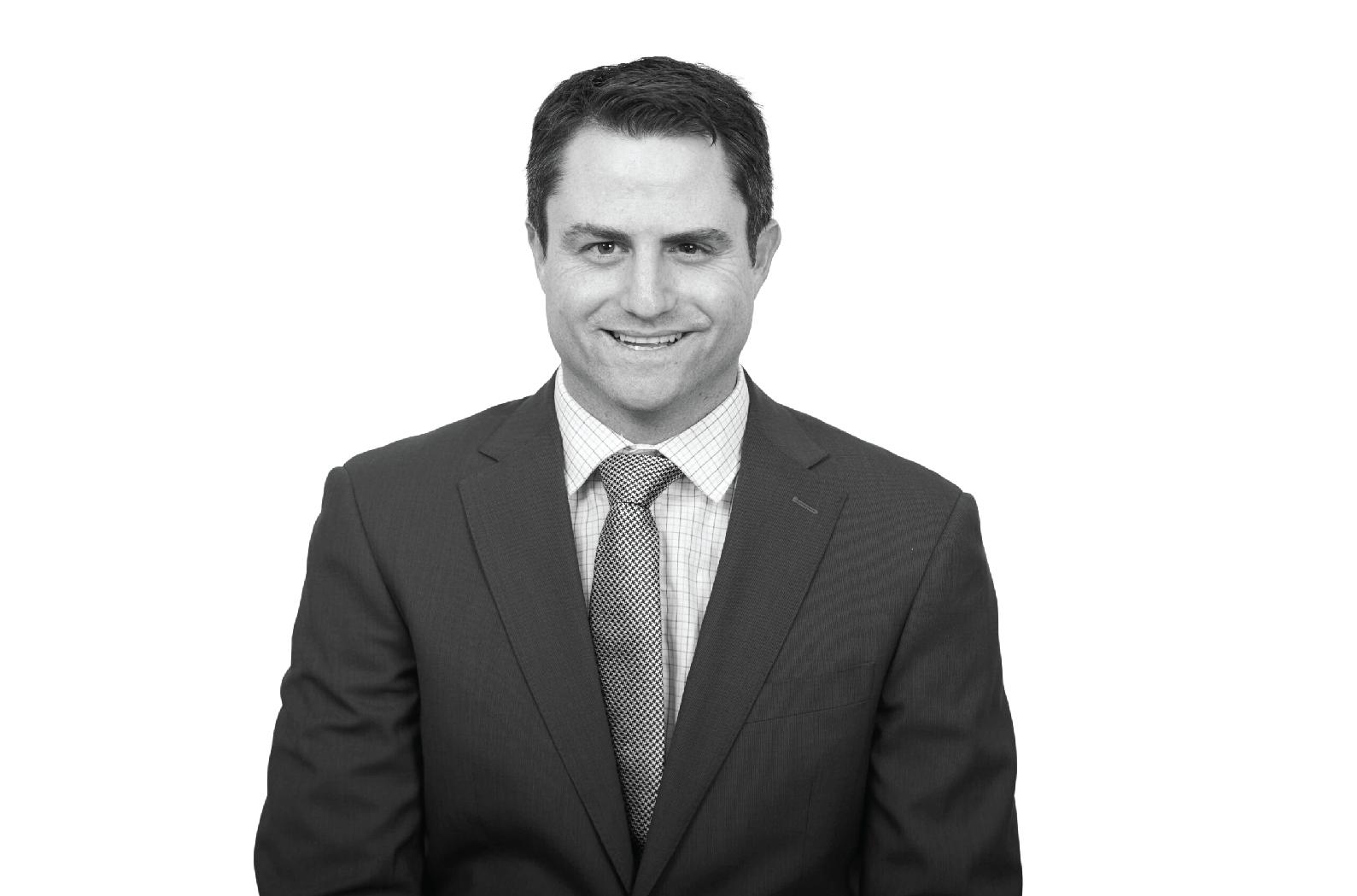
Africa. JLL delivered these services across 30 countries on the African continent in the last 12 months.
The API peer-to-peer awards were established to recognize and promote excellence in Afri ca’s rising real estate sector and have become a critical bench mark for measuring success for the industry.

JLL prides itself on being able to deliver at scale to both multina tional clients with large foot prints, as well as local clients. In the past 12 months, the compa ny completed 75 assets and
executed $490 million capital markets transactions by deal value.This included advising on the largest integrated logistics facility ever in Africa (DSV logis tics facility in Pomona, Johan nesburg) at the start of 2022. Another standout was taking to market a 62-asset portfolio comprising retail, office, and industrial assets to market on behalf of South Africa's largest pension funds; 311’000 square metres leased on the continent. JLL’s Hotels & Hospitality Group has been ranked as the leading hotel investment sales advisor
since 2015.This was again achieved in 2021.
Sustainability is a core pillar of “Beyond”, JLL’s strategic vision to position and equip it to always provide consistent, best-in-class service to its clients, and to drive strong and profitable long-term growth to the ben efit of all its stakeholders. In support of this, the company has invested significantly into its sustainability products and services and the upskilling of its staff. The company’s determination to be at the
forefront of our industry is best illustrated through its ambitious NetZero Carbon target. In 2021, the Science Based Targets Initiative (SBTi) certified the company’s existing target to its new Net-Zero Standard, placing JLL among a select group of companies to align its net-zero commitments with climate science.
The company also imple mented a South African led Design and Build Sustain ability Code and rolled it out on all client projects the first of its kind.The easy-to-use app allows input of project data and tracking of sustainability markers throughout the build lifespan. JLL also hosted Africa’s first ESG and hospitality investment forum and moved its Johan nesburg headquarters to a fully sustainable green rated building.
investmenttimesonline.com 07
INVESTMENT TIMES
JLLP NAMED TOP PROPERTY SERVICE GROUP

Connectivity is an entitlement: how can we make it everyone’s reality?
Connectivity is an essential ingredient to a healthy, safe and productive life. But there

is a notable deficit across rural areas of the world that is blocking a large proportion of society from the benefits a connected life has to offer. In fact, there are 3.7 billion people globally currently living
without an internet connection.
We know that demand for data outstrips supply, leaving many excluded. This is even more exag gerated in places such as sub-Sa haran Africa where the population is growing 2.7% per year. With nearly 30% of Africa’s rural popula tion still living without any mobile broadband coverage, ultra-rural expansion is desperately needed.
There is an appetite for change, yet deploying rural connectivity remains particularly challenging across rural Africa due to a lack of infrastructure and the extremely high costs associated. Mobile Net work Operators and Tower Compa nies simply do not have the capaci ty to combat Africa’s coverage gap alone. Partnership is paramount.
AFRICA’S COVERAGE CHALLENGE CALLS FOR COLLECTIVE ACTION
There is a basic economic chal lenge inhibiting the roll out of cov
erage in rural areas. Deploying infrastructure in remote areas can be twice as expensive, while revenue opportunities for MNOs and Tower Companies can be up to ten times lower. This combination of these financial barriers deeply impacts the business case for deploying infra structure in rural areas.
Addressing this digital divide requires collective action and, as the number one high throughput satellite company in Africa, Avanti is working hard to identify sustainable and economically viable partnerships that will help to address some of the key barriers preventing access to connectivity across the continent.

Over the past year, Avanti has launched several new partnerships to help Mobile Network Operators and other partners expand their net works and accelerate the rollout of low-cost connectivity solutions in some of the hard est-to-reach areas across sub-Saharan Africa. For example, we recently joined forces with the Smart Off-Grid company Clear Blue Technolo gies to forge a lifechanging partnership that is expected to deliver reliable cellular coverage to an extra 200 million people currently living in sub-Saharan Africa, within the next 3 to 5 years.
In May, we also announced a five-year part nership agreement with Free in Senegal. The partnership will extend the coverage of Avan ti’s state-of-the-art HYLAS 4 Ka-band satellite to Senegal and the neighbouring West African countries of Guinea, Sierra Leone, Guinea Bissau, Gambia and Liberia, as well as com pleting Avanti’s coverage of Ivory Coast.
Through such partnerships, we have been able to harness satellite technology to create better access to education, medicine and help provide a safer environment for people to live and work. For example, this major milestone with Free in Senegal is set to significantly increase access to high-speed satellite inter net for the countries’ schools, which will have a colossal impact on education by enabling e-learning services across the region.
A N E W THINKI N G investmenttimesonline.com 10
CONNECTIVITY IS AN ENTITLEMENT
HELPING INDUSTRY PARTNERS TO ACCELERATE PROGRESS
The success of such partnerships has resulted in Avanti launching its own service, Avanti EXTEND, a managed service for rural connectivity to support partners in their efforts to connect rural Africa. For the industry to remain on this upward trajectory, we must contin ue to seek out opportunities that address the barriers prohibiting MNOs and other partners from serving rural communities.
Avanti EXTEND provides high-perfor mance and cost-effective 2G, 3G and 4G solutions to remote and hard-to-reach areas across sub-Saha ran Africa. It enables MNOs and other partners to provide reliable cellular service to the 100 million people living in these challenging locations that would otherwise be impossible to reach using traditional terrestrial infra structure.
Avanti EXTEND has a built-in and fully operational CAPEX solution that inte grates seamlessly into MNOs terrestrial networks to reduce network complexity and increase efficiency. This offers the opportunity for partners to undertake large deployments quickly and effec tively, and scale operations to support
long-term rural expansion at no addi tional CAPEX. It removes the need for them to manage satellite configura tions, hub infrastructure or terrestrial networks to deploy a successful satellite cellular backhaul topology.
The industry has a key role to play in developing new technologies that will help to accelerate a faster, more reliable service, that will benefit millions of people particularly if we are to keep up with the evolving digital landscape.

THE FUTURE IS NOW
In a post-pandemic world, where the reliance on connectivity is at the fore front, the unconnected are becoming even further removed from the modern digital world. We are incredibly proud of the part we have played in changing this reality, but we can’t stop here.
We must continue to work together, to leverage strategic partnerships and seek out opportunities that will enable all areas of society to benefit from a life that connectivity can offer. Connectivity is not a gift; it is a part of the human experience that everyone is entitled to –so let’s make that a global reality.
11
CONNECTIVITY IS AN ENTITLEMENT
Rwanda leads Africa in plastic waste management
The production, use and disposal of plastics pose the biggest chal
lenge in waste management. While individual governments have instituted legislative measures and even signed international conventions aimed at stemming the tide of the plastic waste menace, the world is yet to see an end to plastic pollution.
Across Africa, plastic pollution remains a serious problem, devastating communities’ health, the environment, and the ecosystem that millions depend on for their liveli hood. But amidst this chal lenge, Rwanda remains at the forefront of waste manage ment, earning its capital city, Kigali, the moniker “Africa’s
cleanest city”. Rwanda’s efforts began with a 2008 ban on non-biodegradable plastic bags, which was sub sequently followed by the outlawing of single-use plas tic items, as one of the long-term strategies for becoming a green and climate-resilient nation.

The ban was aimed at mini mising the dangers of plastic pollution to humans, farm animals, aquatic life and the environment. According to a World Bank Report, Rwan da’s current strong institu tional and political will, legal frameworks and citizens active in eliminating plastic pollution foster socio-eco nomic development and environmental protection.
The national motto for sus tainable environmental man agement is: “whatever cannot be recycled or reused must not be produced”.
National policies and laws that make it happen
The country also has a host of national policies and laws concerning general pollution management: Vision 2020 (2000); Rwanda Green Growth and Climate Resilience Strate gy (2011); Regulations of Solid Waste Recycling (2015); and the Law on Environment (48/2018 of 13/08/2018), among others. In addition, there are specific laws or poli cies that focus directly on plastic waste control in Rwanda. These include Law No. 57/2008 of 10/09/2008
investmenttimesonline.com 12 RWANDA LEADS AFRICA IN PLASTIC WASTE MANAGEMENT
relating to the prohibition of the manufactur ing, importation, use and sale of polythene bags in Rwanda (2008).
COMING TOGETHER IN COMMON PURPOSE
Furthermore, as a signatory to international conventions, Rwanda has adhered to its com mitments to achieve ambitious changes in the use, management and disposal of plastics in the country. For instance, as a signatory of the Paris Agreement on Climate Change, the country seeks to contribute to the ambitious goals of the Paris Agreement. The management of plas tic pollution in Rwanda falls within a wider stra tegic, regulatory and policy framework, which sets the foundation for the management of waste. In order for these commitments to really take root however, the backing of the local community is needed. In Rwanda, this has come in the form of “Umuganda“, a Kinyarwanda word that means “coming together in common purpose”. It’s a monthly community work (including community cleanup) reintroduced to Rwandan life in 1998 as part of the efforts to rebuild the country after the 1994 genocide. Today, it takes place on the last Saturday of every month from 08:00 and lasts for at least three hours, with every able-bodied Rwandan aged 18 to 65 taking part.
HOME TO INNOVATORS
Furthermore, Rwanda has also created a dedi cated community of innovators in the field of plastic waste management. These include CareMeBioplastics and Toto Safi, who are both finalists in the Afri-Plastics Challenge. Small and medium enterprises like these illustrate the growing role for the private sector within the plastic value chain, particularly in the African context where government infrastructure and services are limited, even non-existent in some places. CareMeBioplastics is involved in the collection and recycling of plastic, using a mobile app to collect the plastics from the end-users and processing the collected plastic, and turning the plastic waste into valuable items such as school desks, and both indoor and outdoor furniture. Toto Safi’s solution is a reusable cloth diaper service so that parents do not have to choose between convenience and pollution. Through this app, parents will be able
to receive a fresh bundle of sterilised and affordable cloth diapers. These two innova tors represent the wider activity and com mitment that the Rwandan landscape is facilitating. They also demonstrate the importance of public-private partnership in plastic waste management.
SIGNIFICANT CHALLENGES
Despite impressive success, delivery of waste management services in Rwanda still faces significant challenges if the govern ments, industries and businesses do not invest and develop effective and efficient waste management systems. Another chal lenge is a lack of data and data manage ment systems for waste management, which makes it difficult to understand and design policies for waste management and assess the impact of plastics policies on plastic waste recycling reduction in Rwanda.
The government could address these chal lenges by developing a robust data man agement system to gather, record and report on plastics data. Such a system is essential to facilitating policy performance measurement and improvement. It will allow the nation to better track waste accu mulation, waste movements and end desti nations (e.g. tonnages recycled, recovered, or disposed of) including public behavioural changes toward plastic waste management practices, and enable the government to identify and assess oppor tunities for future interventions.
The government also needs to step up its support to separate waste at the source and to handle separated waste during its collection and transportation with the right financial incentives. Gradually increasing landfill tipping fees, fines for illegal dump ing, deposit refund schemes, and other financial incentives according to society’s increasing affluence will help encourage both households and entities to separate recyclable plastics from other wastes, reduce landfill disposal and curb illegal dumping in Rwanda.
investmenttimesonline.com 13 INVESTMENT TIMES
MANAGEMENT
RWANDA
LEADS AFRICA IN PLASTIC WASTE
The private and need to stop working the problem affects Where the public short, the private able to provide support innovation and demonstrated by the tech startups. awareness also play making sure these ceed. It would be incorporate within system, the importance waste management, and the overall circular This encourages systems approach which in turn ensures ity of the overall solutions.
Finally, the government develop effective and provide financial to support local industries as the construction turing sectors recycled materials ufacturing processes ucts.
These are challenges ernments face across globally. There is Rwanda is a global tic waste management efforts should be emulated governments to spur of their economies, clean environment the health and well-being citizens.
AUTHOR: Radhia work Coordinator, lar Economy Co-Founder of Ulubuto

investmenttimesonline.com 14 The Future of Work Capsules
RWANDA LEADS AFRICA IN PLASTIC WASTE MANAGEMENT
Mozambique readies for developing Mphanda Nkuwa Hydroelectric Project
By Kestér Kenn Klomegâh
especially the industrialization programme. As it seeks reliable foreign partnerships, it has already shortlisted a few energy groups for the new US$4.5 billion Mphanda Nkuwa hydroelectric dam, on the Zambezi River, located in Tete province that is estimated to generate 2,070 megawatts for Mozambique. It will be 700 metres long and rise 86 metres above its foundations, with 13 floodgates.
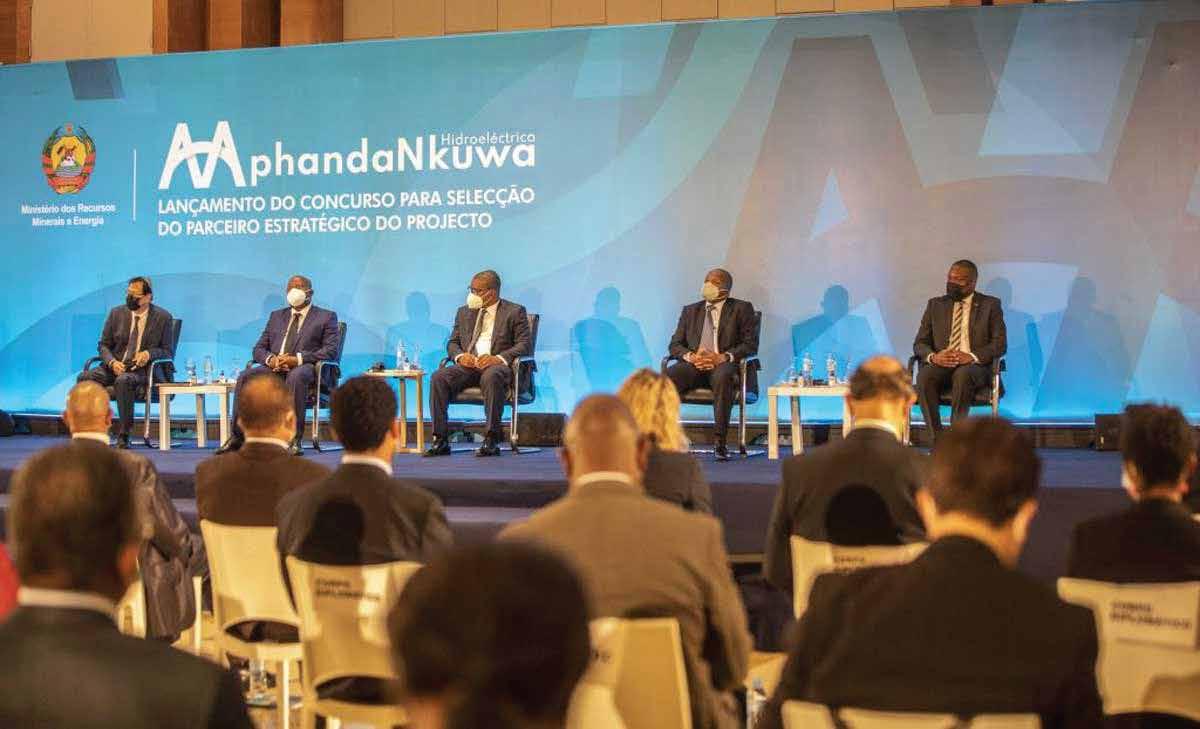
The tender for the "Selection of the Strategic Partner or Investor for the Development of the Mphanda Nkuwa Hydroelectric Project" finally
in December recieved the results of the market survey carried out in September involving the critical aspects of structuring the project, alignment with potential buyers and shareholder participation. The structure of the energy transmission line, the methodology for selecting the strategic partner, the implementation schedule, among other relevant issues related to the project transaction.
According to Malaysian newspaper The Star, the process of selecting the seven potential investors was made at the end of an investor conference held in Maputo. It
A NEW THINKING
Mozambique is ramping up efforts toward establishing a sustainable energy supply to drive its economy
investmenttimesonline.com 16
Nkuwa Hydroelectric Project
further wrote that there were two individual companies and five large consortiums that previously visited the site to understand the natural conditions of the area and assess the fundamental data to prepare proposals from a technical, economic and financial point of view.
The newspaper estimated the infrastructure cost between US$4.5 and US$5 billion and have capacity to produce 1,500 megawatts, making Mphanda Nkuwa the second-largest hydroelectric dam in the country, after Cahora Bassa Hydroelectric (HCB), which generates 2,070 megawatts. With the two infrastructures in fully operational energy production, Mozambique hopes to achieve the goal of universal access to energy and respond to the growing energy deficit that plagues southern Africa.
General Director of the Mphanda Nkuwa development office, Carlos Yum, envisaged that during the construction phase, more than 7,000 jobs will be created, and 50 percent of the energy generated will be exported, con tributing to the country's economy and thus making a regional energy hub in Mozam bique.
The Mphanda Nkuwa project will be a low er-cost power generation option which will position Mozambique as a regional energy
hub, and contribute to universal access, indus trialization, job creation and technical training
while generating tax and concession fee reve nue. The project is fundamental for the energy transition and decarbonization of the south ern region of Africa.
Carlos Yum has laid out the status of the Mphanda Nkuwa hydroelectric dam construc tion project. According to Yun, the project is budgeted at around US$5 billion, and work will start in 2024, the year in which financing is expected to be definitively concluded.
The project will take a total of six to seven years to complete. Of the approximately US$5 billion price tag, 60% is for the construction of the dam and 40% for the power transmission line. At this moment, the development office is preparing the launch of public tenders for the updating of the proj ect's feasibility studies.
By December 2022, the office will launch a tender for the identification of the strategic investment partner, whose financial closing a 2024 deadline has been set. In terms of shareholding, the Mphanda Nkuwa project will have the participation of the Mozambican state, through Electricidade de Moçambique (EDM) and Cahora Bassa Hydroelectric [(HCB), with between 30% and 35% of shares. The remaining 65% will be secured from private investors.
Carta de Moçambique also informed that there would be consultants involved – from Brazil, the United States, Sweden and South Africa – to assess possible problems associated with the project according to the best international practices, avoiding pitfalls that have marred previous projects implemented in the province and in Mozambique generally.
It reported that experts and strategic investors, including the World Bank (WB) and the African Development Bank (ADB), have discussed some significant aspects concerning the implementation of the Mphanda Nkuwa hydroelectric project.
"Overall, we think this project is very important to the government's goal of universal access by 2030," said Zayra Romo, World Bank Mozambique Lead Energy Specialist and Infrastructure Practice Leader. As for the current stage of the project, which consists of the search for a strategic partner for the

Nkuwa Hydroelectric Project
investmenttimesonline.com 17
development of Mphanda Nkuwa, Romo said that the World Bank's support would consist of ensuring the greatest possible competitiveness for the project, with a view to selecting the best contractor or investors that have experience to effectively manage Mphanda Nkuwa.
A press release from the Mphanda Nkuwa Imple mentation Office said that these companies and consortia had replied to the tender launched in December 2021, and delivered their pre-qualifi cation documents before the deadline, first fixed on 28 February but, at the request of several of the bidders, it was extended to 18 April. It is hoped that construction of the new dam (which has been on the drawing board for decades) will finally begin in 2024. Construction will last for at least seven years.
According to the media release by the Mphanda Nkuwa Hydroelectric Project Implementation Office, the main objective is to ensure the coor dination of actions for the implementation of the Mphanda Nkuwa project.
Location: The Mphanda Nkuwa Dam will be located in Tete Province, Centro region, on the Zambezi River, 61km downstream of the Cahora Bassa Hydroelectric Power Plant.
Project description: The Hydroelectric Power Plant will have a capacity of up to 1,500 Mega watts and an Electric Power Transmission Line from Tete to Maputo with 1,300 kilometres.
Budget: US$4.5 to US$5 billion, 60% for the con struction of the dam and 40% for the power transmission line.
Strategic importance: The project will posi tion Mozambique as an energy hub in south ern Africa. It will provide lower cost energy in the country and region, contribute to univer sal access to energy in the country by 2030 and support rapid industrialization, with job creation, skills development and business opportunities (local content). Social and eco nomic benefits, in the form of royalties and income on concession fees for the Mozambi can state.
Environmental approach: The project will be implemented in strict compliance with national standards and internationally accepted best practices for the development of projects of this nature, to mitigate nega tive impacts and maximize positive aspects. In this context, the Mphanda Nkuwa Hydro electric Project Implementation Office recently signed an agreement with the Inter national Hydroelectricity Association for the assessment of the project's sustainability, including training and capacity building.
Mozambique News Agency reported, citing government sources, that there were eight international consortiums interested to become strategic partners of Mozambique in building the Mphanda Nkuwa dam, with electricity production: ETC Holdings Mauri tius, Longyuan Power Overseas Investment (Chinese), PowerChina Resources, WeBuild Group, Scatec (Norway), Sumitomo Corpora tion, EDF and Kansai Electric Power (Japan).
With an approximate population of 30 million, Mozambique is endowed with rich and extensive natural resources but remains one of the poorest and most underdevel oped countries in the world. It is one of the 16 countries, with a collective responsibility to promote socio-economic, political and security cooperation within the Southern African Development Community.
investmenttimesonline.com 17 INVESTMENT TIMES NKUWA HYDROELECTRIC PROJECT
Managing working hours and over time
negatively influences productivity. This brings about delay in production at the workplace as well as reducing employee output and overall organizational per formance demand ing employees to do extra hours work. Furthermore, in situ ations of special assignments, over time is needed and is paid to cater for such tasks that may require employees
Overtime is any work done beyond the regular working hours in a contract of employment. In today’s working envi-
ronment most organizations work eight (8) hours per day,40 hours per week or some even run 12-hour shift. Overtime is mostly the extra hour’s work done by the employee out side the working contract. An allowance is usually payable to the employee for the extra time spent at work.
There are many reasons for overtime at work place some of which include inadequate human resources, this situation negatively affects efficiency, staff rationalization may be adopted as a strategy to enable organization meets certain targets. As a result, there may be an urgent need for employees to work beyond the agreed working hours stipulated in their respective contract of employment. If this occurs, management and employees would have to agree on the duration of over time services needed to achieve set targets. In addition, obsolete resources slow produc tion. Mostly when machines used at the work place are old, its efficiency is affected which
staying beyond the required working hours. Finally, using many manual procedures at work leads to overtime. Most organizations employ the use of manual work in its opera tion hence end up not meeting assigned task or target because the manual effort is insufficient and inefficient in accomplishing task on time to meet management expecta tion.
EFFECTS OF OVERTIME
There will be more demand of overtime allowances by employees, which leads to increase income resulting in increased pro ductivity. Some employees intend to do overtime to earn the admiration of manage ment to be considered for a higher position, the allowance paid for overtime serves as attractive package for the employee. Employers using overtime are also likely to impose too much pressure on their employ ees which can cause serious health chal lenge on them. The employer will then have to incur higher employee medical bills lead ing to high budget for the employer if is not well managed.

investmenttimesonline.com 18 20 A N E W T H INK I N G
WORKING HOURS AND OVER TIME
MANAGING
Lorem ipsum
Employees are likely to be efficient during the extra hours worked as compared to their normal working hours because they expect to have an addtional income from overtime task
If the amount paid for overtime is not well negotiated by the parties involved, in many instances, mostly employees have conflict with their employers on the amount to be paid if it is not clearly stated in the terms of the contract of employment on extra hours work.
RECOMMENDATION
Employees are likely to be efficient during the extra hours worked as compared to their normal working hours because they expect to have an additional income from overtime task. Hence, they may relax their working hours task with expectation to work into extra hours, for overtime. Employers should replace obsolete machines that may cause delay in produc tion and not exhaust employees’ efforts and which affects employee’s health, safety and reduces their productivity, perfor mance and increase the workplace acci dent affecting organizations overall per formance.
Overtime means time worked in addition to one’s normal working hours. Every employer considers overtime as very expensive and for that matter allow over time as and when its expedient. In summa ry overtime is used to clear backlogs or to accomplish task that is time bound. Employers are naturally not in favour of overtime since it increases their wage bill reason why it is used sparingly.

Nevertheless, most employees prefer over overtime since their income will increase when they work overtime. For manage ment overtime needs to be managed pru dently to achieve the desired results else it will lead to lackadaisical attitude in effec tive employee time management.
AUTHOR: LADY JULIANA AMOAH EMAIL
: jupee295@yahoo.com
investmenttimesonline.com 14 INVESTMENT TIMES MANAGING WORKING HOURS AND OVER TIME investmenttimesonline.com
WHY JOB HAPPINESS DRIVES SUPERIOR PERFORMANCE
 By Godswill O. Erondu
By Godswill O. Erondu
m not a social worker, so why should I have to care if staff are happy? I only care about the bottom
line - are they getting the job done?” said the CEO of a certain lumber company.
“Getting the job done is certainly important,” consented the consultant he spoke to, “but at what cost? How many of your people will put in more than what you want done, especially in times of crisis? How many of your people would take a bullet for you?” the consultant quickly enquired.
“I guess I can see your point, but you’d have to convince me it would increase productivi ty,” the CEO conceded. Today most CEOs will quickly respond, “Increasing shareholder
value” to the question: “What's the priority in your company.”
A lot of business leaders are so focused on maximizing profit that they hardly notice what is going on with the people in their organizations. Yet placing profit before the people is like a coach placing the need of the firm before the needs of the players.
Apparently, no coach can build a great team that way. “But that's sport and we are talking business here” a business leader may say. Yet unknown to him this approach is costing him the greater profit he could have made possible. Think about it, the coach does not go into the field, the players do. In the same way, CEOs and managers do not attend to the customers, the employees
A NEW THINKING 20
“I’
do.
Most CEOs function as though their primary responsibility is the customer, yet in reality, this is not true. Most of them haven't even spoken to any customer for decades. Take a bank for instance, how many bank CEOs talk to their customers one-to-one each year.
Again, an Academic institution, how many school directors or VCs go into the class room to teach their students? Business lead ers need to realize that they're simply responsible for the people who are respon sible for doing the job. You jeopardize the result you want to accomplish when you jump the people and go straight to profit. Usually, you can have a short-term profit but the cost of that is much more than you can imagine. You'll have more locked up in your employees than you can unlock. You will shut down their creativity and proactivi ty without knowing it.
Leaders who don't care about their staff like the CEO I mentioned earlier will naturally, without empathy, respond to drop in per formance by replacing the employee. Why? They want result. If you're not performing, then get out of the way let's have someone who will perform.
Unknown to them the reputation of the organization within and outside is at stake as every decision an organization makes is a communication to its employees.
This is a cost. So, people in the organization will come to work each day afraid they might be the next. And fear freezes people's ability to produce outstanding results.
Then your workplace becomes like an airport where people simply arrive and wait for flight. Because they come to work each day but preparing themselves to go through the exit door any moment - sending résumės and attending job interviews.
Now some business leaders, like I heard one say, "soldier go, soldier come business contin ues." Of course, if one employee leaves an organization, he/she will be replaced and busi ness will continue. Yet this way of thinking is very myopic. The cost implications of losing an employee reveals it. Research done by Society for Human Resource Management (SHRM) shows that every time a business replaces a salary earning employee, it costs 6 to 9 months’ salary on average.
For example, an employee who earns #100,000 monthly, that's #600,000 to #900,000. This cost will include recruiting, interviewing, hiring, lost productivity, onboarding, potential customer dissatisfaction, reduced or lost businesses, administrative costs, lost expertise etc.
The problem is that most business leaders do not sit down to consider this financial analysis let alone developing a counter measure. How ever, on the contrary, great leaders understand that if they take care of their employees, their employees will take care of the work. They increase productivity by meeting the needs of people in their charge not necessarily by being in charge of the work itself. Conse quently, one of the ways they do this is by creating a workplace where their employees are happy and enjoy their work daily.
DOES HAPPINESS TRANSLATE TO PRODUCTIVITY?
The CEO I mentioned earlier, though conceded but wanted to be more persuaded that happi ness translates to increased productivity. Does it? Or is it what one of those myths that should be discarded or never accepted? A study conducted by economic researchers at the University of Warwick discovered that hap piness resulted in a 12% increase in productivi ty. On the other hand, unhappy workers were 10% less productive.
According to the research team, happy employees caused significant positive improvements on productivity. Harvard Psy chologist, Teresa M. Amabile Ph.D. with her team studied 26 creative project groups, from 7 different companies selected from three differ ent industries.
21
INVESTMENT TIMES
This project groups required creativity or inno vative solutions in order to get their work done successfully. 238 professionals partici pated in the research forming the 26 groups. Each professional was asked to send in daily confidential electronic dairies describing what had gone on for them in their experience and what their inner work life was like each day.
Over a period of time nearly 12, 000 daily dair ies were assembled and analyzed. And they discovered that overall, the more positive a person’s mood on a given day, the more creative thinking he did that day.
“Across all study participants, there was a 50 percent increase in the odds of having a creative idea on days when people reported positive moods, compared with days when they reported negative moods,” said Teresa. Moreso, when people had one positive emo tions (e.g., feeling happy) on one day, they were not only more likely to have creative
ideas that day, they were also, more likely to have creative ideas the following day and even controlling for that day’s mood - that is, a carryover effect on positive emotions and creative thinking.

Late Tony Hsieh, former CEO of Zappos, an online shoe and clothing retail company which has been built on happiness philosophy said, “You can't have happy customers unless you have happy employees.” That explains the reason behind the quality work that go on in Zappos whether the employee is at the call center or warehouse.
BUT WHY DOES HAPPINESS INCREASE PRODUCTIVITY
It turns out that our brains are literally hardwired to perform
at their best not when they are negative or even neutral, but when they are positivehappy mood. Psychologists have long known that negative emotions narrow our thoughts and range of actions. For example, whenever you feel fear, your thoughts and range of actions will be limited to either get rid of whatever it is or get away from the scene. If you feel anger your thoughts will centre around attacking what ever it is or getting away from the scene.
This is the same with feeling disgusting. Only limited options in your response reper toire - freeze, fight or flee. Imagine that the situation in your workplace have deteriorat ed; salaries are unpaid, management can't
A NEW THINKING 22
You can't have happy customers unless you have happy employees
be trusted etc. and people in the organization have become sad and angry, those two options could play out in different shades for different people.
Some may fight by stonewalling, evading responsibility or absenteeism. While another may flee by resigning and moving on to another organization. However, positive emotions, like happiness, produces what Bar bara Frederickson calls “Broadening effect.
“The epiphany in her study of positive emo tions is that they broaden our perspective or put another way, they expand our possibili ties. They allow us to discard automatic responses and instead look for creative, flexi
ble, and unpredictable new ways of thinking and acting (Fredickson 2004). Therefore, every business leader that intends to get optimal and superior performance from his/her employees must necessarily commit him/herself to creating a workplace where his employees enjoy positive inner-work life.
This will in turn translate to increased bot tom-line performance for the company, better customer experience and increased shareholder value.
Godswill O. Erondu is the pioneer, Africa Workplace Leadership Summit. He is a lead ership expert and works with organizations -

INVESTMENT TIMES Where is Africa’s stance? investmenttimesonline.com 23
Estate & Gift Planning for Business Owners & Executives
By Dr. Benjamin Amoah - UGBS, CEFIS Accra Ghana Peter Kwadow Asare Nyarko - CFLE, Accra Ghana Valentino Sabuco - TFAF USA
Greetings, in support of The Improving Financial Awareness & Financial
Literacy Movement in Ghana’s personal finance content blitz built around the strategic cam paign venues of April known as Financial Literacy Month and six months later during October known as Estate & Gift Planning Awareness Month, the following estate & gift planning article contains some very important messages for you. The vast majority of our adult population does NOT have nor realize the importance of not
having a current or up-to-date estate and gift plan to protect themselves, their family, and their assets; which can include most of your family, friends, and colleagues.
If you are a business owner or executive within an organiza tion, estate and gift planning is not only important to you and your family, but to the success and continuation of your business.

Estate and gift planning is a financial process that can protect you, your family, and the future of your business as
well as a very important component of your overall personal and business financial planning.
Now is the perfect time to put your estate and gift planning house in order
GETTING SICK
If you don't have an up-to-date estate and gift plan and you happen to get hurt or sick and cannot manage your health or financial affairs, the courts will have to appoint some one to manage them for
investmenttimesonline.com 24 ESTATE & GIFT PLANNING?
you.
The person appointed might not be the one you would want to perform those tasks.
As a business owner, who would you want to perform this function, so when you return the business is still operational?
WHEN YOU PASS (DIE)
Without an estate and gift plan, when you pass away, your affairs will be settled by default through a complex legal system deal ing with the laws of intestacy, inheritance, succession - “intestate succession and pro bate." This is further complicated as Ghana recognizes not only statutory laws, but is also guided by various religions and customary succession rights. Therefore, when a legal dispute arises, it is often difficult to establish which law to apply. Not only are there differ ent forms of succession laws in Ghana, but these laws must coexist with marriage laws and the ‘received English law’.
The handling of your financial affairs can turn into a costly and frustrating ordeal for your family and heirs. Your assets may not pass to their desired party, and there are no ways for your legacy plans, or assets (significant or modest) to get to their favorite charities or causes unless some advance arrangements are made.
As a sole business owner what will happen to your business? If it is a valuable asset for your family, will it be kept intact and functional? Who will operate it and how? Or will it be packaged and sold to provide funds to the family? If so how will this be done and by whom?
If you are a business owner and have partners, what will happen to your interest? Will your children and spouse and other family mem bers become the new partners in the business with other partner(s)? Will this help the busi ness or hurt it? Or will the surviving business partners (shareholders) buy out the deceased owner’s interest? Will that be at a fair price or a discounted one?
For executives who work in a company, do you have a session plan when key executives and owners die or get sick?
CRAFTING YOUR ESTATE & GIFT PLAN
The crafting of a good estate and gift plan starts with planning, followed by the proper drafting and signing of appropriate legal documents such as wills, trusts, buy-sell agreements for business owners, powers of attorney for financial management, and an advance health-care directive or health-care power of attorney. Having these documents in place saves you and your family a lot of money and time at a very difficult and emo tional period.
Your estate and gift planning should also address the coordination of the way you hold title to your various assets, your bene ficiary selections on retirement plans and any life insurance, and the possible transfer of certain assets while you are alive.
Regardless of the extent of your net worth, estate and gift planning is important for everyone. Complex strategies may be used by wealthy people to reduce taxes and costs, and arrange for asset management for family members not capable of such management. Others may only require a simple will and/or trust to pass on property to their heirs and provide for minor children.
Even if a simple will and power of attorney are all you require, an estate and gift plan is an essential part of your financial and gift planning. Everybody will need it someday. The time to address or update your estate and gift plan is now.
WALKING THROUGH THE PROCESS
1. DEFINE YOUR GOALS: What do you want to happen to your assets in the event of your death or disability? If your beneficia ries predecease you, who are your alternate selections? How will your assets be distrib uted, and when will these distributions take place?
Decisions on the distribution of your assets
investmenttimesonline.com 25 INVESTMENT TIMES ESTATE & GIFT PLANNING?
should take into account the size of the estate, the ages and abilities of your children and family members, and your personal desires. For example, if you have a larger net worth a distribution to children over time might be wise and consist of something like this: 10 percent of the estate at age 18, 25 percent at age 21, 50 percent at age 24 or upon comple tion of college, and the balance at age 30.
Choose your appointees for important roles: Who will be your executor and, if applicable, trustee and/or guardians? These are parties that will perform specific functions to help to settle and manage your affairs. It is advisable to list at least a first and second alternate for each appointment in case your first choice is unwilling or unable to serve.
If you have children who are minors, the appointment of a guardian is probably the most important decision you'll make. With the court's approval, this person, or persons, will raise your children. Consider appointing a family member and spouse, or another close couple who'll care for your children the way you would want.
You may want to consider listing multiple executors, trustees and guardians to serve together in handling the details of your estate. This can provide a check-and-balance system for the appointees and help them avoid over sights or misappropriations. Consider appoint ing family members, friends, professionals, advisers and/or trust companies for this posi tion. If you have business holdings you may consider having separate appointees to per form these functions as they related to the business(es).
There is some risk with multiple appointees as well: If these people disagree and have prob lems, they can each be represented in court by counsel paid for by your estate to defend or allow their actions, so be very careful in making your selections.
Living trusts have become popular for domes tic and international reasons for those with those of wealth because they offer more priva
cy and less administration is required in comparison with a will. Be aware that having a living trust does not eliminate the need for a will and administration at either the first or second spouse's death.

To get the benefits of the trust, certain details must be attended to, and this is the job of your appointees. For example, the trust must be funded and managed prop erly or benefits can be lost.
Is estate privacy an issue for you? Do you want your estate to be public record upon your death? Do you have any special gifts you want to be made for charity? Do you want an elderly parent or friend to be financially cared for? All of these circum stances should be noted in your plan.
2. GATHER & ORGANIZE YOUR DATA: There are three basic tasks to be accom plished:
Review and update your financial position. Review how you hold title to your assets. Is it consistent with your estate and plan?
Review your beneficiary selections. Are they aligned with your estate plans?
3. ANALYZE YOUR SITUATION: Start by determining your current net worth, assuming your death occurred today. This can be done by totaling your current assets and liabilities and adding the value of any life insurance. Try sketching a picture or flow chart of your existing estate and gift plan. If you have not written a plan, the default laws, customs, and religious beliefs all have one for you and the courts will make the final determina tion. Review your appointees:
Executor Guardian of the Person/of the Property Trustee
Power of Attorney - Financial Management Advance Health-Care Directive or
investmenttimesonline.com 26 A NEW THINKING ESTATE & GIFT PLANNING?
Health-Care Power of Attorney Business Owners: Buy-Sell Agreement, Session Plan
4. DEVELOP YOUR STRATEGIES
With the assistance of your estate planning advisor(s), identify the legal documents that need drafting or make any necessary adjustments to existing documents. Determine any other actions that must be taken for your wishes to be carried out.

5. IMPLEMENT YOUR PLAN: Do what needs to be done i.e., update or create new wills, trusts and powers of attorney, if required adjust the title to your properties, and change alternate beneficiaries of retirement plans and life insurance policies. Consider
making current or planned gifts to your family and your favorite causes and non profits. Provide your executors and trustee with a location sheet as to where you keep things.
6. TRACK & MONITOR YOUR PROGRESS:
Check your estate and gift plan annually or any time there are changes in your family situation or net worth. Use your financial planning calendar to schedule your next review.
https://www.home.thefinancialawareness foundation.org/pdf/T
FAF-CFLE-UG-12MonthFinFitnessCalendar. pdf
Wishing you and your families all the very best,
ESTATE & GIFT PLANNING? investmenttimesonline.com 27
Your parents planned your entry into this world, you have to plan your exit, estate and gift plan is the strategy to protect your love ones.”
- Benjamin Amoah
ALAN KYEREMATEN LEADING AMBITIOUS TRADE POLICY, SIX YEARS ON

COVER STORY
Six years after the successful implementation of the govern ment’s flagship program, One District One Factory, under the leadership of the Trade Minister, John Alan Kwadwo Kyerematen, about 175 factories are currently operating in the country. Mr. Kyerematen spearheaded the ambitious industrialization policy with a mindset of creating jobs, increasing incomes while reducing unemployment among the youth of the country. President Akufo-Addo in 2018 launched the initiative and put in charge one of Ghana’s finest trade expert, Mr. Kyerematen, to ensure the implementation of the program.
LEADING AMBITIOUS TRADE POLICY investmenttimesonline.com 28
There is no doubt that the initiative is one of the polices that secured a landslide victory for President Akuffo-Addo in the 2016 gen eral elections with a record 53.8 percent.
As ambitious as the program may sound, some analysts have argued that this is one of the most impressive trade policies in Ghana’s history since independence as it seeks to establish a factory in each of the country’s 275 districts.
The program has since generated more than 200,000 direct and indirect jobs and is expected to lift the country from an import economy to an export-driven economy by adding value to the country’s raw materials.
Having led the ministry expertly in the last six years, Mr. Kyerematen in 2020 when covid hit the country’s health system ensured that some pharmaceutical companies secured a grant to boost production.
Ghana’s health system was put to a serious test after the emergence of the global pan demic, for this reason the government through the trade ministry secured a grant of GHc15 million for local pharmaceutical man ufacturers under the 1D1F initiative.

Eleven pharmaceutical companies benefited from the grant that was secured from local partners in partnership with the ministry.
Local textile manufacturing industries were also resourced to produce COVID Protective Gear which made them abundantly available and saved government from using hard-earned foreign exchange to import them.
Also, the new strategic economic growth poles such as the establishment of vehicles plants, pharmaceutical manufacturing and garment production which have received dedicated attention by the ministry are also creating highly skilled job opportunities for Ghanaians.
Mr. Kyerematen’s drive at the ministry has made the country witnessed the production of local vehicles by auto giants such as Suzuki, VW, Nissan, Sino Trucks among others under the Automotive Development Policy which was being implemented by the trade minister.
These global auto makers produce the vehi
DEALING WITH ABSENTEEISM AT THE WORKPLACE investmenttimesonline.com 29
Ghana is uniquely positioned to become the new commercial capital for Africa
cles locally and export to other African market and this will boost Ghana’s competitiveness under the Africa Continental Free Trade Area (AfCFTA), a development which was headed by Mr. Kyerematen’s ministry.
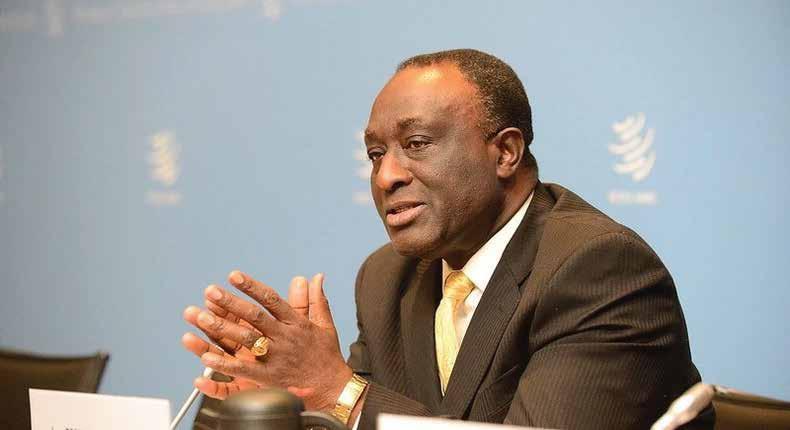
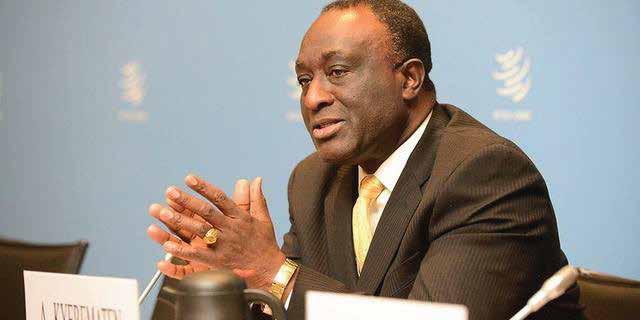
As someone who is passionate about job creation, he said his ministry is focusing on strategic poles such as the Strategic Anchor Industries Initiatives which is developing new strategic growth poles to diversify the econo my and the industrial parks which are provid ing support to private business promoters to establish industrial parks in each of the 16 regions to improve access to land, utilities and business support services for industrial devel opment.
THE AFCFTA VISION
Ghana was selected as the secretariat for the largest single market and the secretariat building was commissioned by the African Union on August 17, 2020, with the vision to end the paradox of Africa being the richest in terms of resources yet the poorest in material wealth.
With AfCFTA, it is estimated that intra Africa trade will increase by US$35billion annually. Under the AfCFTA, the 1D1F policy which has been designed as a comprehensive industrial transformation agenda to drive the manufac turing sector will play a key role for Ghana to harness the opportunities that the agreement presents.
Mr. Kyerematen who led Ghana’s team that secured the nod for the secretariat to come to Accra believes that Ghana is uniquely posi tioned to become the new commercial capital for Africa.
It’s estimated that the total cost of about 20 categorised items imported into the country amounted to US$10 billion annually.
According to data from the Ghana Trade Advocacy Network, values for various prod ucts imported include tin tomatoes-$1 billion, rice-$800 million, Sugar and confection ery-$300 million, flour-$600 million, poultry and meat-$400 million, fish-$245 million, fresh tomatoes from Burkina Faso – $100
million and toilet rolls and tissue-$100 million.
The rest are cooking oil-$300 million, phar maceutical and chemicals-$750 million, soaps and cosmetics, plastics-$500 million, paper-$600 million, tiles and ceramics-$200 million, iron and steel products-$600 million, cars and spare parts-$2 billion, furni ture-$250 million, textiles and apparel-$250 million, home appliances-$900 million and beverages-$200 million.
However, trade experts believe that with government’s determination to ensuring that the country produces its own products local ly the cost of import to the country is expect ed to be reduced drastically in the long term as the factories begin to operate at their peak.
Recently, President Akufo-Addo together with his trade minister, Alan Kyerematen, began a tour on various regions to commis sion some factories in fulfillment of the gov ernment’s promise towards the 1D1F initia tive.
This goes a long way to buttress the point that the minister has stayed true to his words of creating jobs for the youth through the government’s industrialization agenda.
Among these remarkable progress made towards the initiative, there are plans to also revamp the Kade Match factory, which was set up to produce a critical household item to Ghanaians, by second quarter next year.
The Aveyime rice project, another critical project which is needed in this critical moment is expected to receive support to start production as well in early next year to reduce the country’s huge reliance on the importation of rice.
It’s therefore undeniable fact that, the suc cessful implementation of the 1D1F policy will jumpstart the country’s economy and put it on the path of recovery, as dynamic trade minister Alan Kwadwo Kyerematen continue to steer affairs of the ministry with his vision of creating jobs through value addiction of the country’s raw materials.
DEALING WITH ABSENTEEISM AT THE WORKPLACE investmenttimesonline.com 30



The Giving Capsules: Let’s take the SDG pledge together. Part 2
 By Baptista S. H.Gebu (Mrs.)
By Baptista S. H.Gebu (Mrs.)
Let’s take the Sustainable Development Goals pledge together. Pledge with me to make sustainability a priority person
ally. Pledge with me, “I understand that my actions, behaviors, and choices make an impact on the society, environment, and our economy. I pledge to make intentional choices that will benefit the quality of life for myself and advo cate for choices that benefit the lives of others”. Don’t only be awesome in life, learn to #beHu mane.
Every 21 September was Kwame Nkrumah Memorial Day in Ghana. This holiday commem orated the birthday of Ghana's main indepen dence leader, first prime minister, and first president, Osagyefo Dr. Kwame Nkrumah. He was one president that believed so much in Africa. To this end, it’s great to know of the Afri can Unions agenda 2063 as visibility on it is low compared to the SDG. Look out for a special feature - the Africa we want is possible, lets
form it together.
Ghana recently launched its 2022 Voluntary National Review (VNR) report on the Sustain able Development Goals (SDG’s). The 1992 constitution of the Republic of Ghana provides the expectations from government, citizens, and other entities on what should be accom plished by the state. These expectations make room for human rights, balanced development, environmental protection, international affairs, among others. According to the report, a total of 102 indicators were assessed in the 2022 VNR compared to 66 in the year 2019.
World leaders declared the period 2020 to 2030 as the Decade of Action for the Sustain able De¬velopment Goals (SDGs) in Septem ber 2019. According to His Excellency Nana Addo Dankwa Akufo-Addo, President of the Republic of Ghana in his opening remarks read on his behalf; He cherished strongly the hope
INVESTMENT TIMES DEALING WITH ABSENTEEISM AT THE WORKPLACE investmenttimesonline.com 31
that this would trigger the rapid scaling-up of sustainable solutions needed to address the critical challenges facing our world. Unfortu nately, few months after this historic declara tion, our world was hit by the devastating COVID-19 pandemic, push¬ing us into “un chartered territory”, while fear and sheer terror gripped many.
The pandemic since have had a devastating effect on lives, livelihoods, global supply chains, businesses, and significant¬ly eroded the development gains made over the last decade and the prospects of achieving the SDGs have become more daunting, but he dare say that giving up is not an option for Ghana. As the world re-opens up and begins to recover from the deleterious effects of the pandem¬ic, the SDGs have, become even more relevant as they present us with a credi ble pathway for a prosperous, inclusive, resil ient and peaceful world. Continuing from pre vious publication…
What then is the status of the indicators as reported in the 2022 VNR on the SDG’s?
SDG goal six is looking at ensuring availability and sustainable management of water and sanitation for all. According to the report, access to improved drinking water sources has improved from 87.7% to 92.2% an indication Ghana is on the path to achieving is national target of equitable access to basic drinking water services by 2025. Interestingly the two main sources of water are sachet water (51.5%) and pipe-borne (33.5%) for urban and borehole/tube well (33.6%) and pipe-borne water (28.8%) for rural. What will become of this progress with an increase in utilities seeing sachet water earmarked to be sold at GHC0.50 per sachet with immediate effect? Greater Accra, Bono, Upper West, Ashanti and Central regions are said to have almost achieved universal access whiles Northern, Oti, North East and Savannah still lacks access to improved water sources. Sanitation is equally a great issue of interest, household toilet coverage according to the report also increased from 46% in 2010 to 59.3% in 2021 and for both periods access to
toilets was higher among urban than rural households.
Households using public toilets have declined by 12% to 23% from 35% in 2021 and same for open defecation from 19% to 17.7%. What then are the emerging issues for consideration; For Ghana to achieve the
target of ending open defecation by 2030, it will require an average annual reduction of about 2% of population without toilet facili ties. More than 45% of households are still without toilet facilities and the progress towards ending open defecation is slow. Data from the 2021 population and housing census (PHC) revealed 70.6% of households still dispose-off waste water on the ground and on the street and outside. This practice is common in rural (88.9%) than urban (58.7%) areas with only 2.3% households relying on sewerage system for waste water disposal. With water systems, discharge of wastewater by soak away is common in Greater Accra region (17.8%) the practicing of throwing water on the ground is more common in Bono East region (89.3) by regional segrega tion.
There is equally slow progress to achieving the very high scale of integrated water man agement. Our water basins and water quality are also affected with activities of illegal mining, uncontrolled pollution and dumping of refuse into river bodies.
SDG goal seven is to ensure access to afford able, reliable, sustainable and modern energy for all. Ghana is on track to achieving
DEALING WITH ABSENTEEISM AT THE WORKPLACE
A NEW THINKING investmenttimesonline.com 32
As the world re-opens up and begins to recover from the deleterious effects of the pandemic, the SDGs have, become even more relevant as they present us with a credible pathway for a prosperous, inclusive, resilient and peaceful world
the universal access to electricity with 86.3% of the population said to be connected to the national grid in 2021. Urban population used about 95.2 % of electricity as main source of lighting in 2021 and 72.6% for rural areas for 2021. Greater Accra region continues to enjoy the highest electricity coverage (96.1%) whiles Upper East region has the least (57.0%). The proposition of urban (51.3%) and rural (14.8%) households using gas (LPG) as their primary cooking fuel increased according to the report whiles the proposition of households using electricity as the main source of cooking declined from 0.5% in 2010 to 0.4% in 2021. Inter estingly enough, the use of charcoal and wood has remained the main cooking fuel for more than half of the total population translating into a 54.3%.
The electricity generation mix in Ghana is approx imately 34.1% for hydro as against 65.3% for ther mal and a further 0.6% for renewables. Renew able energy share of the total final energy con sumption has seen a decline from 42.7% in 2019 to 39.6% in 2021. What then are the emerging issues for consider ation; the increasing cost of Liquified Petroleum Gas (LPG) is a challenge. Media reports on price hikes has it that; in January 2022 a kilogram of LPG sold at GHC8.93 totaling a GHC129.49 for a 14.5 kg then in May 2022 the same commodity sold for GHC11. 18 for a kilogram, this means GHC162.11 will be the total cost for the same 14.5kg.
Its September 2022 now, can you imagine the cost as we approach the yelitude? Switch back to charcoal will affect the level of progress however the heightened economic situation could compel more people to opt for charcoal in a bit to man aging the tough times. The situation that more than half of household population depends still on wood fuel and charcoal means is of great con cern.
Further issues include the gradual improvement in the share of renewables in energy generation mix, decreasing cost of solar panels, continuous disparity in access to electricity between the northern and southern parts.
Earlier publication reviewed progress made for SDG goals one to 6. Subsequent editions will review the other SDG goals to include; goal 8 promote sustained, inclu sive, and sustainable economic growth, full and productive employment, and decent work for all. Goal 9 build resilient infra structure, promote inclusive and sustain able industrialization and foster innovation. Goal 10 reduce inequality within and among countries. Goal 11 make cities and human settlements inclusive, safe, resilient and sustainable. Goal 12- ensures sustain able consumption and production patterns. Goal 13 take urgent action to combat climate change and its impacts. Goals 14conserve and sustainably use the oceans, seas and marine resources for sustainable development. Goal 15- protect, restore and promote sustainable use of terrestrial eco systems, sustainably manage forests, combat desertification, and halt and reverse land degradation and halt biodiversity loss. Goal 16 –promote peaceful and inclusive societies for sustainable development, pro vide access to justice for all and build effec tive, accountable and inclusive institutions at all levels. Goals 17-strengthen the Means of Implementation and Revitalize the Global Partnership for Sustainable Devel opment.
Baptista is a Hybrid Professional and the Executive Director of ProHumane Afrique International. ProHumane is a charitable, development & think thank organization working with communities & individuals to create sustainable solutions to transform communities through diverse pro-poor initiatives. Pro-poor initiatives are initiatives that help to alleviate poverty.
Baptista is a realist, affable, simple and humane. You can reach us via e-mail on prohumaneafrique@g mail.com and follow this conversation on all our social media sites: Linked-In/ Twitter/ Facebook/ Instagram: ProHumane Afrique International. Call or WhatsApp: +233(0)262213313. Hashtag: #behu mane #thegivingcapsules #prohumaneafriqueint #fowc
EMIRATES INVESTS US$2BN TO ENHANCE CUSTOMER EXPERIENCE investmenttimesonline.com 33
INVESTMENT TIMES
THE GIVING CAPSULES















investmenttimesonline.com 34 Emirates invests US$2bn to enhance customer experience
Why knowing where You stand is
By: Dr. Benjamin Amoah - UGBS, CEFIS Accra Ghana Peter Kwadow Asare Nyarko - CFLE, Accra Ghana Valentino Sabuco – TFAF, USA
This is the fourth feature column in our Improving Financial Awareness & Finan cial Literacy Series, and it is on inventory
ing what you own and owe.
It is a fact of life: you must know where you are before you can make plans to go somewhere else. Developing a detailed description of your financial position is more than an accounting exercise, it is an important life skill. A complete statement of your financial position starts by ¨

Listing what you own, called Assets
Listing what you owe, called Liabilities
Determining your Net Worth, Assets less Liabilities
Plus, where your money comes from and where it goes, called Cash Flow, which will be addressed in the next column. This information
is essential in making wise financial deci sions, and doing future planning.
This column will focus on assessing your Net Worth, and it involves more than arriv ing at a dollar figure. It is important to understand what kinds of assets and liabili ties underlie your numbers and how they affect your overall financial picture. When it comes to assets, for example, liquidity is a key consideration. In other words, how readily can you convert an asset into cash?
Someone with a portfolio of various short-term cash accounts and publicly traded stocks and bonds that can be sold quickly, is in a much different financial position than someone whose only asset a house or building or land that might take months to sell. On the liability or debt side,
investmenttimesonline.com 35
WHY KNOWING WHERE YOU STAND
similar distinctions come into play. The issues and choices raised by credit card debt or an impending balloon payment on a car or home loan are much different from those connected with a balance on your fixed-rate term loan.
Inventorying your Assets (what you own) and Liabilities (what you owe) to determine your Net Worth is a key starting point to managing personal finances and making informed everyday finan cial decisions. This is also one of the first steps in the process of seeing how all of the pieces of your financial life are intercon nected from savings and spending, working, addressing planning for your financial inde pendence / retirement, major expenditures, investments, and dealing with taxes to insurance and est ate and gift planning.
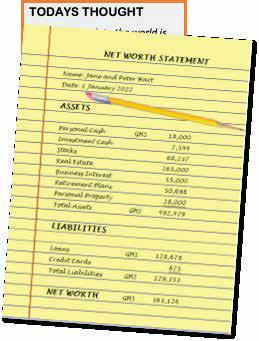

This process helps you to better understand your overall financial picture, and will either reassure that you are under financial con trol and you are on the road to success, or it will bring to your attention financial problems that need addressing. Either way, you will know your status and be in a position to take control of your situation.
INVENTORY YOUR ASSETS
Start by getting a pad of paper or opening a computer spreadsheet. Have a calculator, your things-to-do list (if you're missing information, note it as a reminder) and your financial organizer (the place you keep your important documents) close at hand.
At the top of the page title it Net Worth Statement, followed by your name and the date, skip a few
lines or rows, then label a column Assets. Go down a few lines or rows and list each of your assets under the categories in the box below. Note their current dollar values to the immediate right. Create a separate page called Additional Net Worth Informa tion. Use it to list any assumptions or document any special circum stances.
When you're finished inventory ing all of your assets, add a line called Total Assets and total your entire asset column. Are you surprised with the number?
LIST YOUR LIABILITIES
Skip a few lines and write Liabili ties; follow the same procedure as you did for assets. Add a line called Total Liabilities and total your entire liability column. Are you surprised with this number?
DETERMINE YOUR NET WORTH
Now add a final line called Net Worth. Subtract Total Liabilities from your Total Assets. The number you are looking at is what you would be worth if you sold everything (before tax effects).
What do you think of this number?
Is there anything you can do to improve it today or in the future? How does it compare with last year's number?
TRACK YOUR PROGRESS
It is useful to update your Net Worth Statement annually and compare it to prior years to give you an overview of your financial progress. For many people the beginning of the year is an excel lent time to take an inventory of
investmenttimesonline.com 36
WHY KNOWING WHERE YOU STAND
your current financial position. This is essen tial information you will need for making any wise informed personal financial decisions and for doing your long-range financial plan ning. Once you have completed the process, you will find that managing your money will be easier. Like straightening your closets or cupboards at home, this takes some effort at the outset, but requires only minimal energy and time if you keep things organized going forward.
Identifying Your Personal & Investment Cash

Your personal circumstances will determine your need for cash. If your total cash position is below the level suggested here, do not panic but begin developing a savings plan to build up your personal cash position before making any long-term investments. Here are some general guidelines. If you are An employee who is unsure about his/her future job status
A business owner
A retiree
It is suggested, as a goal, that you keep one years living expenditures (not including income taxes, and adjusted for your inflation factor) in interest-bearing cash accounts. (Two years is more conservative) If you have more than two years living expenditures in conser vative securities that are easily convertible to cash (and are not in a tax-deferred retirement plan needed for retirement), then you can reduce your cash reserves to six months’ per sonal living expenditures. (12 months is more conservative)
If you are in a very secure job position, a mini mum of six months’ living expenditures should be your objective for liquidity. (12 months is more conservative) Consider these funds as a personal asset they affect your current standard of living.
If you have an excess of cash over the amount of your “personal living expenditures require ment,” consider these excess funds as an Investment Asset they are working for your
future standard of living or retirement.
While you are building your cash reserves or as an added safety net you should consider establishing a line of credit. It’s important to establish a line of credit before you need it. Waiting until you really need cash or until an emergency occurs may force you to apply for a loan when your creditworthiness is not at its best. You can obtain a line of credit based on the value of your home, or by apply ing for an unsecured line of credit from your bank. You can also obtain a low-interest credit card to put aside for use only in emergencies.
CHECKLIST FOR COMMON TYPES OF ASSETS & LIABILITIES
ASSETS
¨ Cash & Cash Equivalents: Accounts with banks, savings and loans, credit unions, stock brokerages, insurance or mutual fund companies that are held outside your retire ment plan accounts. These include check ing/savings accounts, short-term certificates of deposit, money-market accounts, saving bonds and money market funds, along with U.S. Treasury bills with a maturity date less than one year along with any other cash.
¨ Stocks & Stock Mutual Funds: Include those publicly traded on any exchange and outside your retirement accounts. Don't include stock from a privately held or small business corporation. If you have accounts with brokerage houses or money managers, simply list the firm's name and the stock totals. Be sure to list cash accounts from these statements under Cash & Cash Equivalents.
¨ Bonds & Bond Mutual Funds: Those owned outside your retirement plans. If you have accounts with brokerage houses, list that company's name and bond totals. Be sure to list cash accounts from these statements under Cash & Cash Equivalents.
¨ Stock Options: Company-provided stock options along with options to buy or sell a particular stock. If you have equity in options
INVESTMENT TIMES investmenttimesonline.com 37 Getting organized WHY KNOWING WHERE YOU STAND
external entity here refers to a company formed outside the Republic of Ghana that has a registered place of business in Ghana

investmenttimesonline.com 38
“The laws of the Republic of Ghana permit the setup of external companies. An
(market value for the option is greater than what you have to pay for it), list the market value here and set aside what you have to pay for it until later.
¨ Retirement Plans: Pension Plans, Prof it-Sharing Plans, individual retirement plans that have current value, also company pension plans that have a definable value. If you have a pension plan that will pay a lifetime income, note it on the Additional Information sheet.

¨ Notes Receivable: Parties who owe you money. This includes all promises to repay money extended to family and close friends.
¨ Real Estate: Home, rental units, vacant land or commercial buildings. Also any frac tional shares owned in time-shares or other real estate, unless set up as a partnership. If you're not sure of the value now, estimate it and note on your things-to-do list to contact a Realtor for an opinion of value.
¨ Partnerships: Joint ventures, general partnerships and limited partnerships.
¨ Business Interests: Limited Liability Companies, Corporations and Other than partnerships, in which you are actively involved.
¨ Annuities: Fixed, variable, accumulat ed, immediate and private annuities. Do not include tax-sheltered annuities here; list them under Retirement Plans.
¨ Life Insurance: List only the cash values (the value you would receive if you ended the policy today), not the death bene fits.
¨ Personal Property: Furnishings, appli ances, jewelry, works of art, sports equipment and other such personal assets. Be careful not to overvalue items such as automobiles, com puter equipment, phones and home enter tainment items; these may not be worth as much as you think. Estimate price based on a reasonable fair market value. A review of the classified ads will provide a good start for determining the value of personal property.
¨ Other Investment Property: Art, collectibles, hard money assets (gold coins and rare stamps), and any other investment property not included in other line items.
Investment property is property you intend to sell for a profit.
LIABILITIES
¨ Loans: Home mortgage, real estate, home equity line of credit, life insurance cash value loan, retirement plan loan, auto loan, student loan, and any other personal or investment loans except credit cards. Record any outstanding credit card balances under Credit Cards.
¨ Credit Cards: List outstanding balances.
¨ Other Debts: Stock options purchase values, mortgage payments, property and income taxes, and other unpaid household bills (you may want to list unpaid household bills as a single item).
To do a true net worth statement, you would determine the built-in gains if you were to sell your assets and compute your income tax liability. However, if you are not putting together a statement for an estate or a divorce and these amounts may not be material, you may want to skip that calcula tion.
As you put the pieces of your financial picture together, you may be surprised by some of the information assembled. Or you may simply have filled in details of what you already knew. In either case, you are bring ing a new level of organization to your finan cial life.
Just as important, gathering this data will heighten your awareness of your own finan cial needs, choices and issues. When it comes to managing your money, that aware ness is one of the real keys to success. This is the fourth in a series outlining the Your financial PARTNER Personal Financial Management System. Next we will look at the dynamics of your money where it comes from, where it goes and how you might want to change it.
For additional information visit us at •Dr. Benjamin Amoah UGBS, CEFIS Accra Ghana http://ugbs.ug.edu.gh/association
investmenttimesonline.com 39 WHY KNOWING WHERE YOU STAND



A N I N V I T A T I O N T O N E W L I V I N G C o n n e c t i n g y o u w i t h p r o p e r t y , e f f o r t l e s s l y A C C R A L I V I NG & I NV E S T I NG w w w . f o r t u n a h o m e s g h . c o m +233 54 632 114 6 C A L L U S T O D A Y
Feeding the hungry in Africa…can leaders prioritize

and
address food security challenges?
By Kestér Kenn Klomegâh
Global food security, especially in Africa, has been in the media publica tions these past few months. While a few outspoken African leaders shifted blames to Russia-Ukraine crisis, others focus on spending state budget to import food to calm rising discontent among the population.
Some experts and international organizations have also expressed the fact that African lead ers have to adopt import substitution mecha nisms and use their financial resources on strengthening agricultural production systems.
At the G7 Summit in June, President Biden and G7 leaders announced over $4.5 billion to address global food security, over half of which will come from the United States.
This $2.76 billion in U.S. government funding will help protect the world’s most vulnerable populations and mitigate the impacts of growing food insecurity and malnutrition, including from Russia's war in Ukraine, by building production capacity and more resil ient agriculture and food systems around the world, and responding to immediate emer gency food needs.
U.S. Congress allocated $336.5 million to bilateral programs for Sub-Saharan African countries, including Burkina Faso, the Demo cratic Republic of the Congo, Ethiopia, Ghana, Guinea, Kenya, Liberia, Madagascar, Malawi, Mali, Mozambique, Niger, Nigeria, Rwanda, Senegal, Sierra Leone, Somalia, South Sudan, Tanzania, Uganda, Zambia, and Zimbabwe and regional programs in southern Africa, west Africa, and the Sahel.
Also of this $2.76 billion, USAID is program ming $2 billion in emergency food security assistance over the next three months. As of August 8, 2022, the U.S. has provided nearly $1 billion specifically for countries in Africa toward this $2 billion commitment, includ ing Central African Republic, the Democratic Republic of the Congo, Ethiopia, Kenya, Mali, Mozambique, Nigeria, Somalia, South Sudan, and Uganda.
That compared, Russia plans to earn (reve nue) $33 billion by the end 0f 2022 through massive export of grains and meat poultry to Africa. The plan remotely aims at marginaliz ing local production, cut out foreign contri butions to support livelihoods through local production and make African leaders spend their hard-earned revenue on food imports instead of supporting agricultural produc tion.
Primarily, Russia needs to export an estimat ed 50-60 million tonnes of grain this agricul tural year from July 2022 to June 2023. Agri culture Minister Dmitry Patrushev and Alge rian Agriculture and Rural Development Minister Mohamed Abdelhafid Henni, co-chairing the Russian-Algerian Intergov ernmental Commission on late September, agreed on an increased wheat exports from Krasnodar Territory and Siberia regions to Algeria.
The Agriculture Ministry's Agroexport Center said in a report that Russia has to increase exports to Angola. The estimated potential for Russian agribusiness exports to Angola is $100 million per year, and this includes grains, foremost wheat, soybean oil, beef,
investmenttimesonline.com 40 FEEDING THE HUNGRY IN AFRICA
Cover Story
poultry, edible pork by-prod ucts, yeast and other agribusi ness products.
Agroexport Federal Center for Development of Agribusiness Exports in close partnership collaboration with Trust Tech nologies and the business expert community drew up a concept for the development of exports of principal agricul tural products (grain, dairy, butter, meat and confectionery products) to promising mar kets of African countries. It is estimated to build on the total volume of exports to African countries which in 2021 amounted to $33 billion.
"The African continent is an interesting and promising area for the development of Russian food exports. However, when working in this market, it is important to take into account a number of factors: strong differences in the level of wel fare of the population, political instability in some countries, state regulation of prices for a number of goods, et cetera," Agroexport head Dmitry Kras nov was quoted as saying in the statement and reported by Russian media including the Interfax News Agency.
By increasing grain exports to countries in Africa, Russia aims at enhancing the competitive ness of Russian agricultural goods in the African market. According to the business con cept report, five African coun tries have been identified and chose as target markets for the delivery of the agricultural products. These are Angola, Cameroon, Ethiopia, Ghana,

Kenya, Mauritius, Nigeria, Tunisia and South Africa.
In a sharp contrast to food-importing African coun tries, Zimbabwe has increased wheat production especially during this crucial time of the current Rus sia-Ukraine crisis. This achievement was attributed to efforts in mobilizing local scientists to improve the crop's production. Zimbabwe is an African country that has been under Western sanc tions for 25 years, hindering imports of much-needed machinery and other inputs to drive agriculture.
At the African Green Revolu tion Forum (AGRF) summit held September in Rwanda, President Emmerson Mnan gagwa told the gathering that "we used to depend on importation of wheat from Ukraine in the past, but we have been able to produce our own. So, the crisis in that country has not affected us. There is an urgent need to adopt a progressive approach and re-purpose food policies to address the emerging challenges affecting our entire food systems."
There are various local efforts to attain food security on the continent. For instance, the African Development Bank's (AfDB) African Emergency Food Production Facility (AEFPF) to increase the pro duction of climate-adapted wheat, corn, rice, and soy beans over the next four growing seasons in Africa. The International Fund for
investmenttimesonline.com 41 FEEDING THE HUNGRY IN AFRICA
The African continent is an interesting and promising area for the development of Russian food exports. However, when working in this market, it is important to take into account a number of fac tors: strong differences in the level of welfare of the population, political instability in some countries, state regulation of prices for a number of goods, et cetera
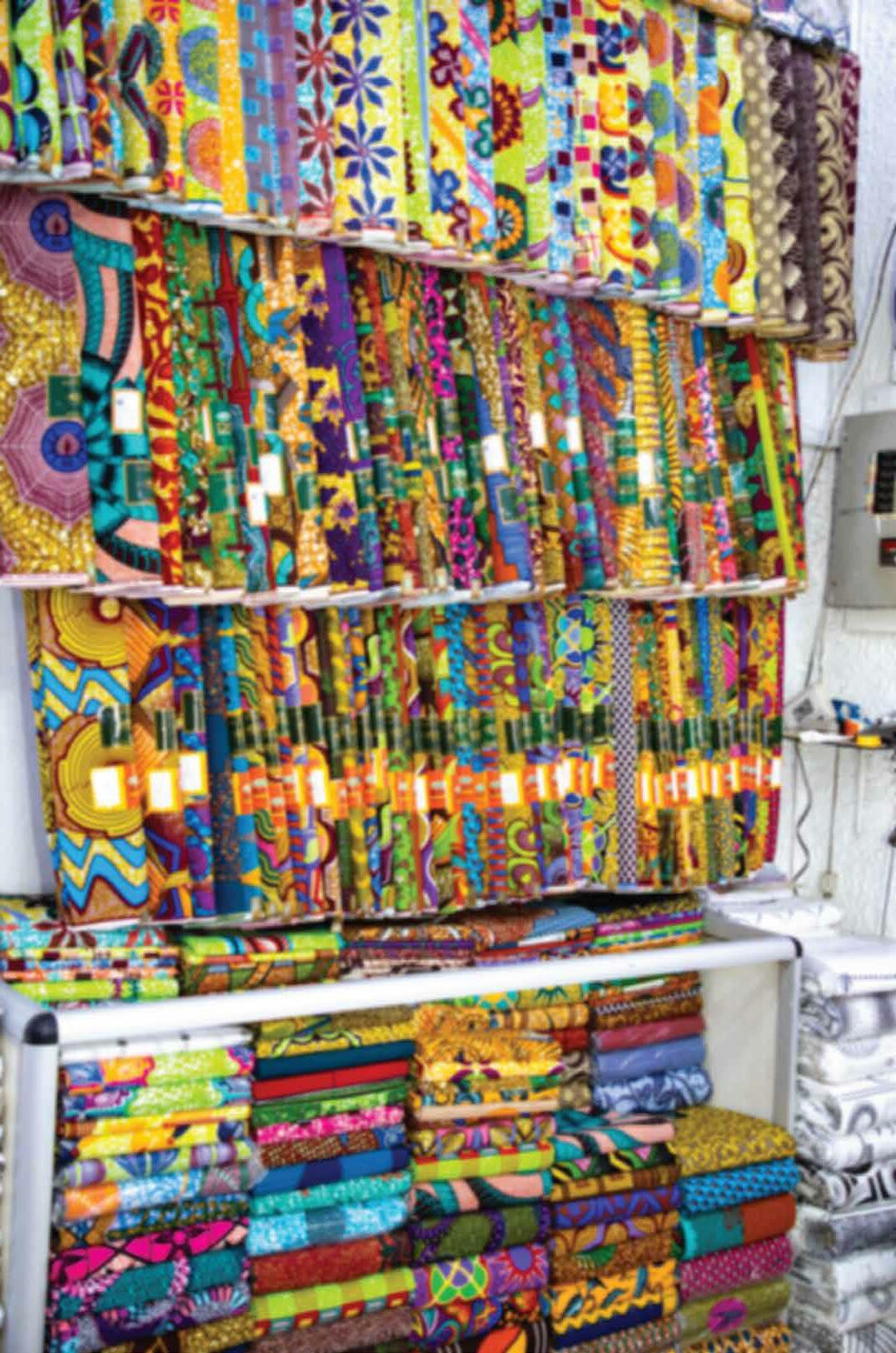
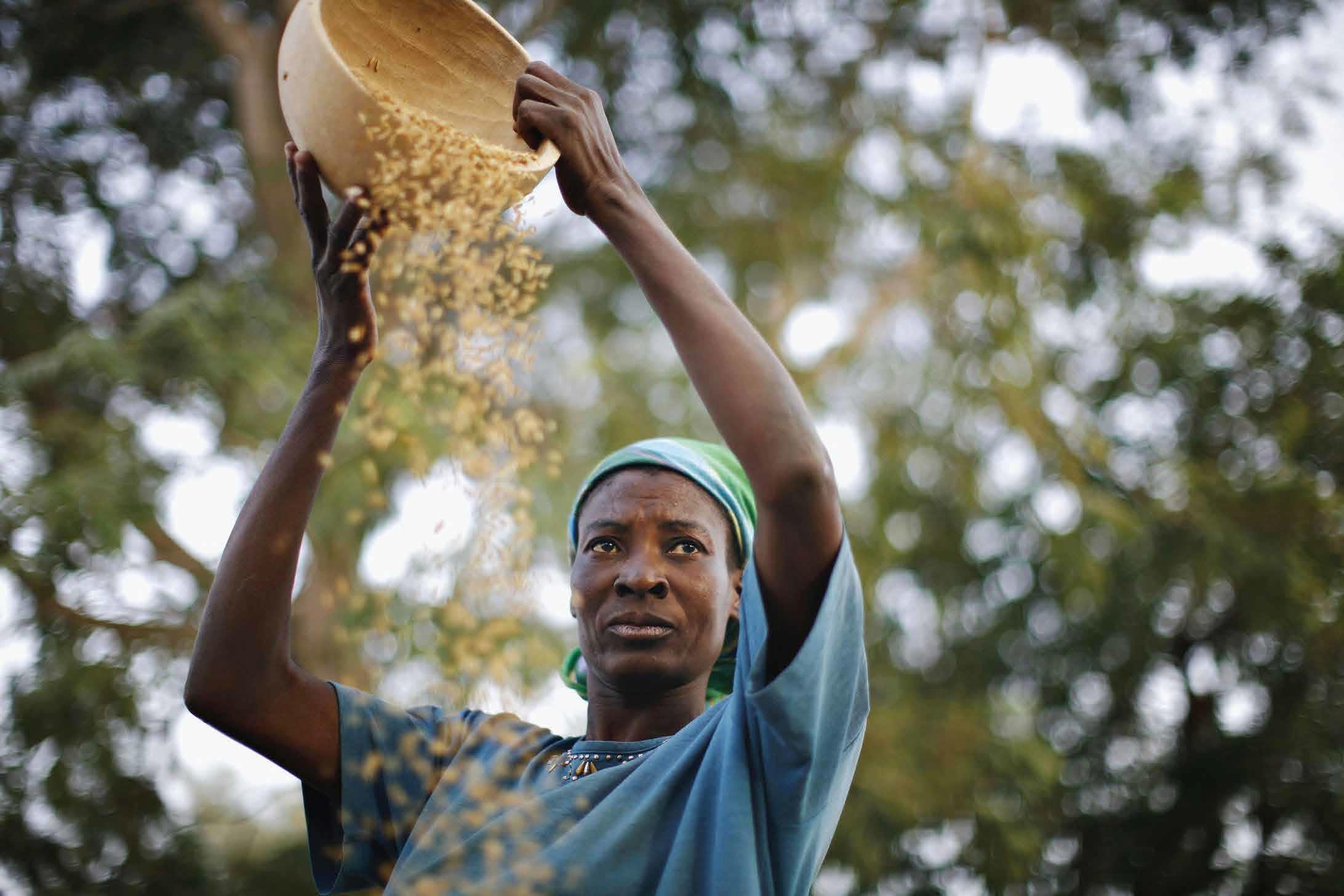
investmenttimesonline.com
Agricultural Development's (IFAD) Crisis Response Initiative (CRI) to help protect livelihoods and build resilience in rural communities. The Africa Adaptation Initia tive (AAI) to develop a pipeline of bankable projects in Africa, to leverage private equity.
The Africa Risk Capacity (ARC) Africa Disas ter Risk Financing Programme (ADRiFi) to help African governments to respond to food system shocks by increasing access to risk insurance products. A fertilizer efficien cy and innovation program to enhance the efficiency of fertilizer use in countries where fertilizer tends to be over-applied. Support for the UN Food and Agriculture Organization (FAO) will fund soil mapping spanning multiple countries to provide information allowing for wiser water usage, greater fertilizer conservation, and improved climate resilience impacts.

Significant to note that during business conference held at the Atlantic Council's Africa Center on April 22, African Develop ment Bank Group President Dr. Akinwumi Adesina, speaking as a guest of the Wash ington, DC, US-based think tank, called for an increased sense of urgency amid what he described as a once-in-a-century con vergence of global challenges for Africa, including a looming food crisis. The conti nent's most vulnerable countries have been hit hardest by conflict, climate change and the pandemic, which upended economic and development progress in Africa.
Adesina said the ramifications of Russia's invasion of Ukraine on Feb. 24 spread far beyond the conflict to other parts of the world, including Africa. Russia and Ukraine supply almost 30% of global wheat exports, and the price has surged nearly 50% glob ally, reaching levels reminiscent of the 2008 global food crisis.
Adesina said the tripling of fertilizer costs, rising energy price and rising costs of food baskets, could worsen in Africa in the coming months. He noted wheat made up

90% of Russia’s $4 billion in exports to Africa in 2020, and of Ukraine's nearly $3 billion in exports to the continent, 48% was wheat and 31% was maize.
Adesina said Africa must rapid ly expand its pro duction to meet food security chal lenges. "The Afri can Development Bank is already active in mitigat ing the effects of a food crisis through the Afri can Food Crisis Response and Emergency Facili ty, a dedicated facility being con sidered by the bank to provide African countries with the resources needed to raise local food produc tion and procure fertilizer," Adesina said. "My basic principle is that Africa should not be begging. We must solve our own challenges ourselves without depending on others…"
The bank chief spoke about early successes through the African Devel opment Bank's innovative flag
Getting organized FEEDING THE HUNGRY IN AFRICA
INVESTMENT TIMES
ship initiative, Technologies for African Agri cultural Transformation (TAAT) program, which operates across nine food commodi ties in more than 30 African countries. TAAT has helped to rapidly boost food production at scale on the continent, including the pro duction of wheat, rice and other cereal crops.
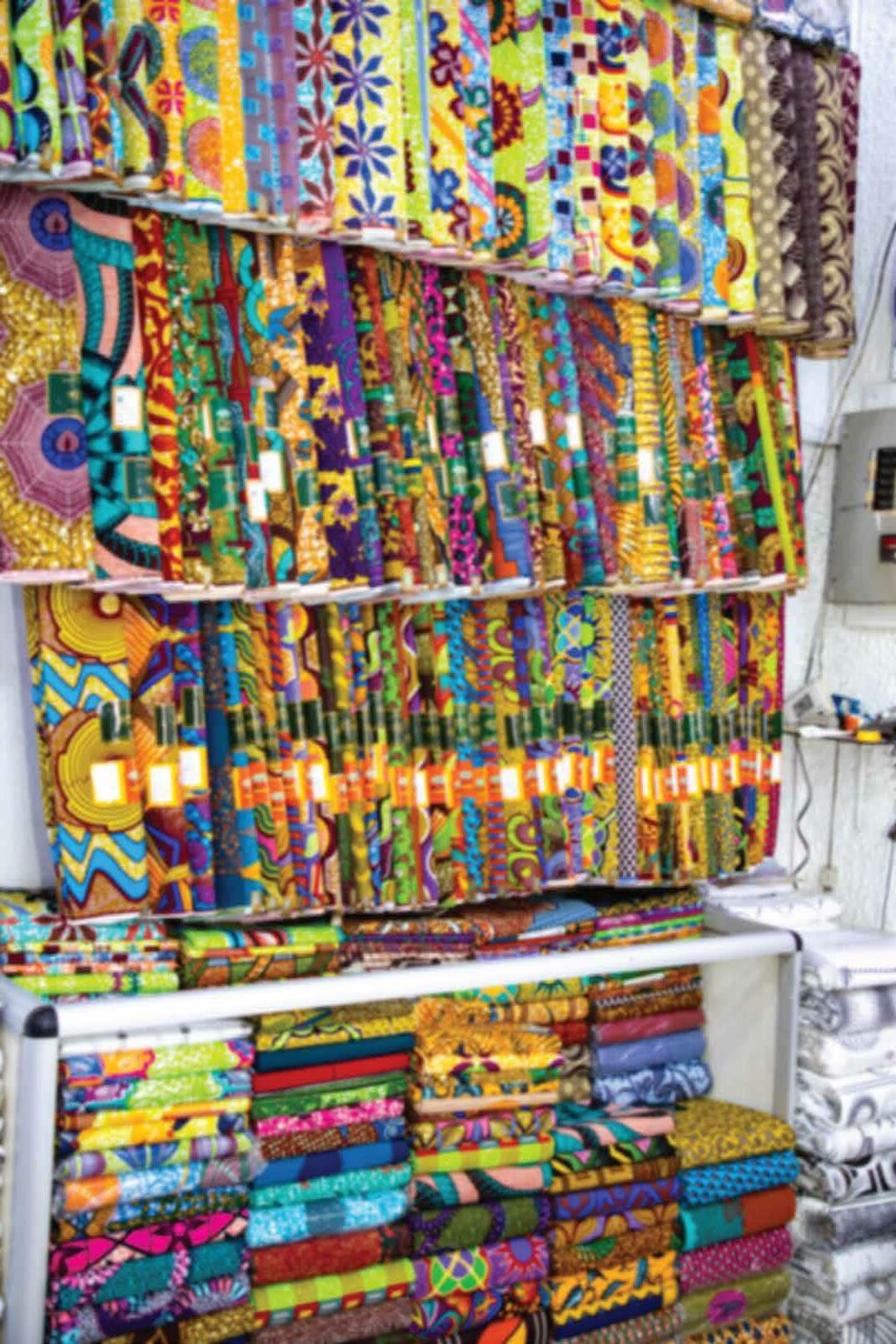
"We are putting our money where our mouth is," Adesina said. "We are producing more and more of our own food. Our Africa Emer gency Food Production Plan will produce 38 million metric tons of food." He said TAAT already had delivered heat-tolerant varieties of wheat to 1.8 million farmers in seven coun tries, increasing wheat production by over 1.4 million metric tons and a value of $291 million. He added that during the drought in southern Africa in 2018 and 2019, TATT was able to help deploy heat-tolerant maize vari eties which were cultivated by 5.2 million households on 841,000 hectares.
In a similar argument and direction, the World Bank has also expressed worry over sub-Saharan Africa countries high expendi ture on food imports, that could be produced locally using their vast uncultivated lands, and devastating impact on budgets due to rising external borrowing. According to the bank, it is crucial to increase the effectiveness of current resources to expanding and sup porting local production especially in the sectors of agriculture and industry during this crucial period of Russia-Ukraine crisis.
In a press release titled African Govern ments Urgently Need to Restore Macro-Eco nomic Stability and Protect the Poor in a Con text of Slow Growth, High Inflation, the global lender said African governments spent 16.5 per cent of their revenues servicing external debt in 2021, up from less than 5 per cent in 2010. Eight out of 38 IDA-eligible countries in the region are in debt distress, and 14 are at high risk of joining them.
In late May 2022, the IMF and World Bank considered 16 low-income African countries to be at high risk of debt distress, while 7 countries Chad, Republic of the Congo,
Mozambique, São Tomé and Príncipe, Somalia, Sudan and Zimbabwe were already in debt distress. Bright spots, such as Côte d'Ivoire and Rwanda, are expected to exhibit rapid growth in 2022, the report said. However, 33 African countries need external assistance for food, and acute food insecuri ty is likely to worsen in the next months in 18 of these economies.
With the above facts, African leaders have to demonstrate a higher level of commitment to tackling post-pandemic challenges and the Russia-Ukraine crisis that have created global economic instability and other relat ed severe consequences. And this requires collaborative action, and much stronger pace of transformation to cater for the needs of the population over 1.3 billion in Africa.
Máximo Torero, chief economist of the Food and Agriculture Organization, has observed that African policies have relatively failed to alleviate food security problems. It has emphasised the fragility of over-depen dence on a globalised agricultural system. What is needed to achieve a more integrat ed and regionalized agricultural system is coordinated public policy responses to sup port agribusiness. These responses must ensure small and medium-sized farmers are included.
Action can be taken at a regional level too. And it would help identify issues relating to market access, border and transport-related problems, and possible anticompetitive behaviour. The integration of regional econ omies is one vehicle for alleviating pervasive food security issues. But regional integration can't be achieved without the appropriate support for investment in production, infra structure and capabilities.
An estimate suggests that rich Africans were holding a massive $500 billion in tax havens. Africa's people are effectively robbed of wealth by an economy that enables a tiny minority of Africans to get rich by allowing wealth to flow out of Africa.
According to our basic research, Africa is not poor as foreign player are stealing its wealth. But there is $203 billion leaving the continent. Based on a set of new figures, sub-Saharan Africa is a net creditor to the rest of the world to the tune of more than $41 billion. Then there’s the $30 billion that these corporations repatriate – profits they make in Africa but send back to their home country, or else where, to enjoy their wealth.
In an opinion article published September by Foreign Policy in Focus, Imani Countess wrote that every year nearly $90 billion of African resources are lost to the global north in Illicit Financial Flows, or IFFs. It isn't just the Rus sians, but also U.S.-based corporations and others throughout the global north. Russians are flying unprecedented huge quantity of gold out of Sudan, precious resources from the extractive industry out of Central African Republic and Guinea.
According to him, "the financial mechanisms that facilitate illicit financial flows are com plex, most often through opaque deals and contracts involving government officials. People in these plundered communities do not have a voice. They face harm to local bio diversity, loss of their livelihoods, and a lack of meaningful benefits, especially in providing sustainable development. The losses are breathtaking and heartbreaking, as they rep resent revenue that should be invested in sus tainable development in Africa."
University wrote in a joint article that people living in extreme poverty in the sub-Saharan Africa increased from 290 million in 1990 to 414 million in 2010. The region currently spends more than $35 billion on food imports per year.
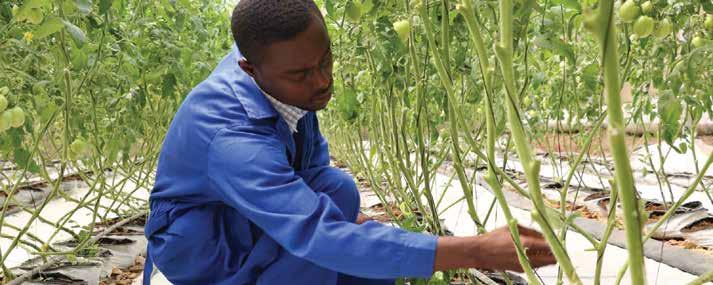
Of the challenges currently facing the conti nent, it is climate change that has greatly slowed down Africa's progress towards MDGs, especially those related to eliminat ing hunger and poverty, improving human health and ensuring environmental sustain ability. This is because climate change disproportionately affects the livelihoods of the most vulnerable population by increas ing the occurrence of natural disasters, affecting the continuity of ecosystem func tioning and the ecosystem services it pro vides. Climate change also damages the critical natural resources that vulnerable communities depend on.
Establishing food security is important for millions of people facing hunger in Africa and is crucial for sustainable economic development and long-term prosperity of the continent. Addressing food security in a changing climate, therefore, is key for a rising Africa in the 21st century. From the discussions above and various perspectives, African leaders have to focus and redirect both human and financial resources toward increasing local production, the surest approach to attain sustainable food security for over 1.3 billion population in Africa, and this falls within the framework of the Agenda 2063 of the African Union.
A NEW THINKING
Dr Richard Munang is UNEP's Africa Regional Climate Change Programme Coordinator and Ms. Zhen Han is a doctoral student at Cornell


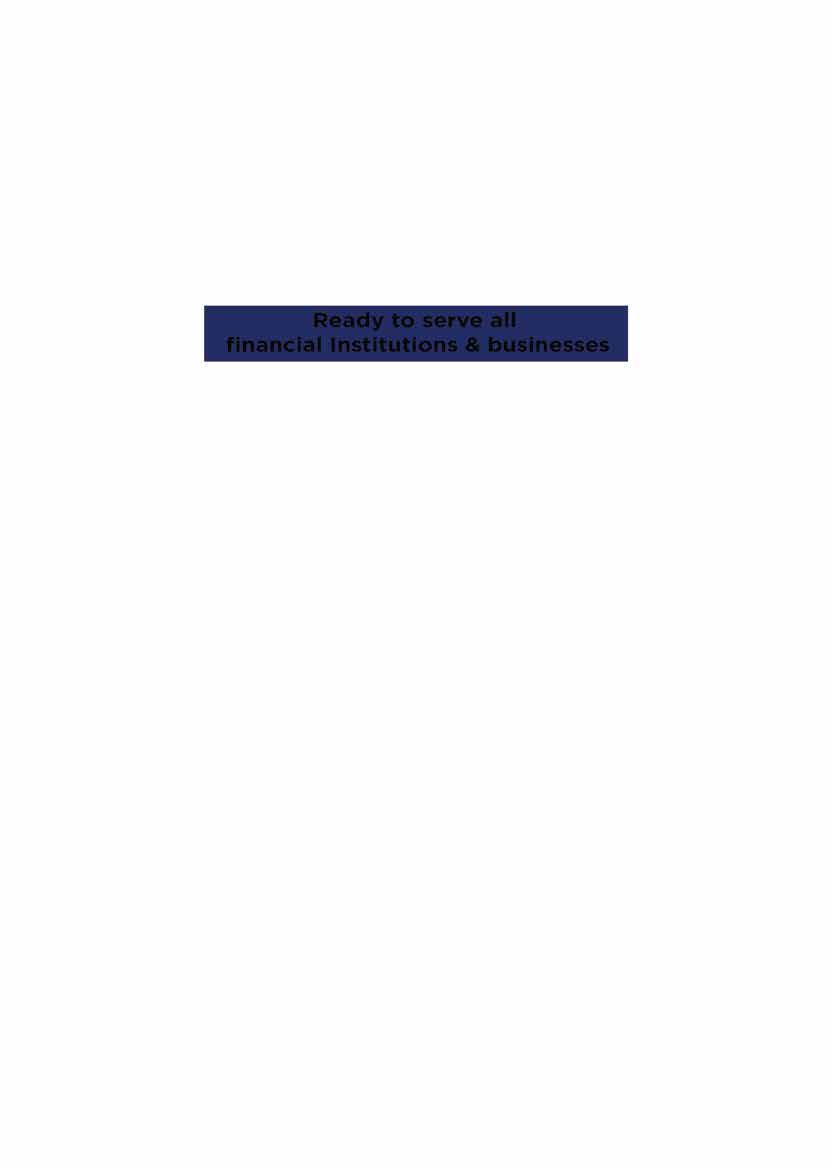

Critical views on Russia’s policy towards Africa within context of new world order
In September WhatsApp conversation with Matthew Ehret, a Senior Fellow and Interna tional Relations Expert at the American Uni
versity in Moscow, he offers an insight into some aspects of Russia-African relations within the context of the emerging new global order.
In particular, Matthew gives in-depth views on Russia's valuable contribution in a number of economic sectors including infrastructure devel opment during the past few years in Africa, some suggestions for African leaders and further on
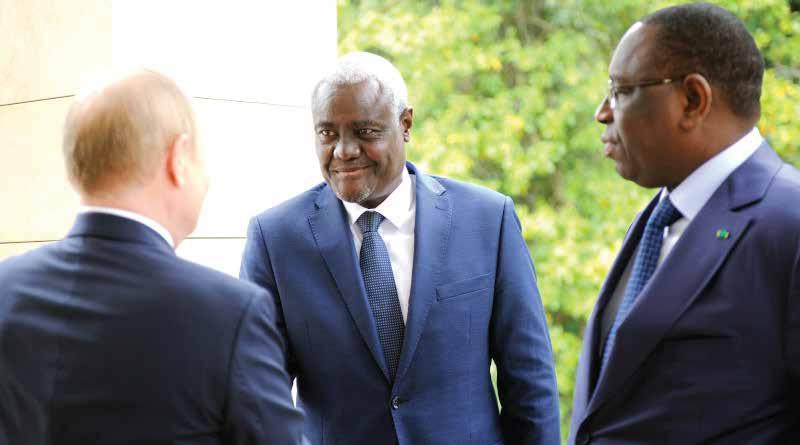 By Kestér Kenn Klomegâh
By Kestér Kenn Klomegâh
the possible implications of Russia-China collaboration with Africa. Here are import ant excerpts of the wide-ranging interview:
Q: What are the implications here and from historical perspectives that Russia is looking for its allies from Soviet-era in Africa...and "non-Western friends" for creating the new world order?
A: Russia is certainly working very hard to consolidate its alliances with many nations of the global south and former non-aligned
CRITICAL VIEWS ON RUSSIA’S POLICY TOWARDS AFRICA
investmenttimesonline.com 46
network. This process is hinged on the Rus sia-China alliance best exemplified by the integration of the Eurasian Economic Union with the Belt and Road Initiative and the spirit of cooperation outlined in the the Feb. 4 Joint Statement for a New Era of Coopera tion.
Of course this is more than simply gaining spheres of influence as many analysts try to interpret the process now underway, but has much more to do with a common vision for instituting a new system of cooperation, creative growth and long term thinking unit ing diverse cultural and religious groups of the globe around a common destiny which is a completely different type of paradigm than the unipolar ideology of closed-system thinking dominant among the technocrats trying to manage the rules based interna tional order.
Q: Soviet Union, of course, enormously sup ported Africa's liberation struggle and as a result attained political independence in the 60s. What could be the best practical way for Russia to fight what it now referred to as "neocolonialism" in Africa?
A: Simply operating on a foundation of honest business is an obvious but important thing to do. The African people have known mostly abuse and dishonest neo-colonial policies under the helm of the World Bank and IMF since WW2, and so having Russia continue to provide investment and business deals tied to the construction of special eco nomic zones that drive industrial growth, infrastructure and especially modern electrici ty access which Africa desperately needs are key in this process.
Q: African countries currently need to trans form the untapped resources, build basic infrastructure and get industrialized -these are necessary to become somehow economic independent. How do you evaluate Russia's role in these economic areas, at least, during the past decade in Africa?
A: It has been improving steadily. Of course,
Russia does not have the same level of national controls over their banking system as we see enjoyed by China whose trade with Africa has attained $200 billion in recent years while Russia's trade with Africa is about $20 billion. But despite that, Russia has done well to not only provide trains in Egypt, and has made the emphasis on core hard infra structure, energy, water systems, and inter connectivity a high priority in the 2019 Rus sia-Africa Summit and the upcoming 2023 Summit.
Q: Generally, how can we interpret African elite's sentiments about Russia's return to Africa? Do you think Russia is most often critical about United States and European Union's hegemony in Africa?
A: I think the over arching feeling is one of trust and relief that Russia has returned with a spirit of cooperation. According to all the messaging from Lavrov who recently com pleted an important Africa tour late July, I can say that Russia is very critical of the USA and EU approach to hegemony in Africa. As Museveni and the South Africa Foreign Min ister have recently emphasized, they are sick
investmenttimesonline.com 47
INVESTMENT TIMES CRITICAL VIEWS ON RUSSIA’S POLICY TOWARDS AFRICA
A: Russia is certainly working very hard to consolidate its alliances with many na tions of the global south and former non-aligned network. This process is hinged on the Russia-China alliance best exemplified by the integration of the Eurasian Economic Union with the Belt and Road Initiative and the spirit of coopera tion outlined in the the Feb.
of being talked down to and threatened by western patronizing technocrats, whereas we see a sense of mutual respect among the discourse of Russian and Chinese players which is seen as a breath of fresh air.

While the west is obsessed with "appropriate green technologies" for Africa while chastizing the continent for its corruption problems (which is fairly hypocritical when one looks at the scope of corruption within the Wall StreetCity of London domain), Russia supports all forms of energy development from coal, oil, natural gas and even nuclear which Africa so desperately needs to leapfrog into the 21st century.
Q: Understandably, Russia's policy has to stim ulate or boost Africa's economic aspirations especially among the youth and the middle class. What are views about this? And your objective evaluation of Russia's public outreach diplomacy with Africa?
A: So far Russia has done well in stimulating their youth policy with expanded scholarships to African youth touching on agricultural science, engineering, medicine, IT, and other advanced sectors. Additionally the Special Eco nomic Zones built up by Russia in Mozambique, Egypt have established opportunities for man ufacturing and other technical training that has largely been prevented from growing under the IMF-World Bank model of conditionality laced loans driven primarily by the sole aim of resource extraction for western markets and overall control by a western elite. Russia has tended to follow China's lead (and her own historic traditions of aiding African nations in their development aspirations) without push ing the sorts of regime change operations or debt slavery schemes which have been common practice by the west for too long.
Q: Sochi summit has already provided the key to the questions you have, so far, discussed above. Can these, if strategically and consis tently addressed, mark a definitive start of a new dawn in the Russia-African relations?
A: Most certainly.
Q: Geopolitical confrontation, rivalry and competition in Africa. Do you think there is an emerging geopolitical rivalry, and confrontation against the United States and Europe (especially France) in Africa? What if, in an alliance, China and Russia team up together?
A: China and Russia have already teamed up together on nearly every aspect of geo political, scientific, cultural and geo-eco nomic interest imaginable which has created a robust basis for the continued successful growth of the multipolar alliance centered as it is upon such organi zations as the BRICS+, SCO, ASEAN and BRI/Polar Silk Road orientation. This is clear across Africa as well and to the degree that this alliance continues to stand strong, which I see no reason why it would not for the foreseeable future, then an important stabilizing force can not only empower African nations to resist the threats, intimidation and destabilizing influences of western unipolarists.
investmenttimesonline.com 48 A NEW THINKING
CRITICAL VIEWS ON RUSSIA’S POLICY TOWARDS AFRICA
Cocoa has consistently featured as a major export commodity for decades in Ghana. Production of ‘food of the




Maximizing cocoa production
Source: Ghana Cocoa Board
Source: Ghana Cocoa Board
Cocobod Subsidiaries and Divisions
Emmanuel Amoah-Darkwah
Regional Breakdown




Ghana has six cocoa growing regions (old administrative regions) thus Ashanti, Brong Ahafo, Eastern, Central, Western and Volta. Cocoa production in Ghana was led by Ashan ti between 1947/1948 and 1983/1984 crop. This has since been taken over by Western region since 1984/1985. In the 2019/2020 crop season, total cocoa production hit 766,977 metric tonnes. In terms regional breakdown, Western region produced 332,647, followed by Ashanti with 165,830, Eastern with 89,131, Brong Ahafo with 88,460, Central with 85,526 and Volta with 5,383.

A NEW THINKING investmenttimesonline.com 51
MAXIMIZING COCOA PRODUCTION
Despite the significant positive impact of the sector on the livelihoods of Ghanaians, the sector is threatened by climate change and illegal mining popularly known as ‘galamsey’
Source: Ghana Cocoa Board
Source: Ghana Cocoa Board
Ghana’s Cocoa Export Destination
Source: Author’s Model
Proposed Model
Climate Change
Climate Change
tively on cocoa ing to the Intergovernmental Change’s (IPCC) temperatures in increase at a faster age increase in UNDP Climate Ghana estimates annual temperature Celsius by the 2060s Celsius by the Climate-Smart Agriculture Organization Climate-Smart Agriculture grated approach and climate change following objectives:
1) Sustainably increasing tivity, to support equitable increases in farm incomes, food security and development;
2) Adapting and building resilience of agricul tural and food security systems to climate change at multiple levels; and
3) Reducing Greenhouse Gas (GHG) emissions from agriculture (including crops, livestock and fisheries) (FAO 2013).

Syndicated Loan
For close to two (2) decades, Ghana through Cocobod has been contracting syndicated loan for the purchases of cocoa beans. In 2020/2021 crop season, the country raised US$ 1.3 billion at an interest rate of 1.75% plus libor. In all, 28 banks partook in the syndica tion with 4 being local. In the ensuing 2021/2022 crop season, the board has secured US$ 1.5 billion syndicated loan for cocoa purchases. This model of purchases should change in the medium term. Govern ment through the Central Bank should initiate steps to encourage universal banks to allocate funds for purchases of cocoa beans. The clean-up exercise in the financial sector in 2017 has resulted in strong balance sheet of

enable banks engage in this financial trans action.
Regulatory Regime
At present, Cocobod sells locally on average 30% of cocoa beans purchased. For instance, in the 2019/2020 crop season, 32% of cocoa beans were processed domestical ly according to a source at the Monitoring and Evaluation Department of Cocobod. In boosting local processing of cocoa beans into semi-finished and finished goods, there should be an amendment of the regulation of cocoa export. Ghana should position itself to effectively participate in the US$ 140 billion chocolate industry. Investors in the cocoa value chain will invest in Ghana if they have assured access to raw materials.
International Alliances
In August, 20221, the two West African cocoa producing countries established the Ghana Cote d’voire Cocoa Initiative Secre tariat in Accra. The cooperation will focus on the sustainability of cocoa production, research, economics and marketing of

nvestmenttimesonline.com 52 MAXIMIZING COCOA PRODUCTION
cocoa from the two coun tries. This alliance is signif icant as the two coun tries produce 62.2% of world’s output. This world’s value of choc olate industry is US$140 billion but distribution along the value chain is uneven. Final manu facturers and retailers earn 79.4% while cocoa farmers earn between 5%-10%. This narrative must be changed to ensure fair distribution of cocoa pro ceeds in the global value chain.
Conclusion
Cocoa has over the decades generated substantial foreign exchange proceeds for the coun try. Government and other stake holders should resolve the teething challenges in the sector which include illegal mining (galamsey), access to inputs for farmers, climate change challenges, low income level for farmers among others. The Productivity Enhancement Programs (PEPs) which includes rehabilitation of cocoa farms, hand pollination, fertilizer application etc should be con tinued to boost cocoa pro duction in the country. There should be a bigger conversation on land ownership in Ghana especially lands for agricultural purposes for sustained economic develop ment.

investmenttimesonline.com 53 MAXIMIZING COCOA PRODUCTION


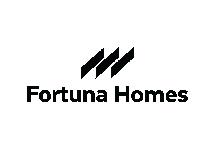

investmenttimesonline.com 34 B E AU TY L IE S IN TH E D E TAIL S T u r n y o u r s p a c e i n t o s o m e t h i n g e x t r a o r d i n a r y Complete Design & Install Textiles & Curtains Bathrooms, Kitchens & Wardrobes Doors Windows Tiling C A L L T O D A Y

Aligning our educational systems to meet the domestic agenda in economic challenging times

CSome few years back, The Ghana Tour ism Authority under the auspices of the Ministry of Tourism Arts and Culture out
doored the “See Ghana, Eat Ghana, Wear Ghana, Feel Ghana” campaign in a bid which also aimed at igniting the “I am Ghanaian Spirit”. A friend of mine a very proud Ghana ian indeed is a supporter of the super eagles of Nigeria. He is very serious about it and keeps cheering them anytime they play. I’m still trying to conceive and understand how a Ghanaian can disown Ghana black stars for the supper eagles of Nigeria. Maybe some body can help me understand the psychology behind this behaviour. Anyone may choose not to support the black stars who indeed won yesterday for whatever reason, however, to support another country rather than Ghana, it’s tantamount to lacking the “I am Ghanaian spirit”.
The Ministry of Tourism and Creative Art and the GTA deemed it necessary to come up with this concept perhaps because some Ghanaians today do not possess the “I am Ghanaian Spirit” and they believe it’s a chal lenge and there is a need to conscientize the public.
It’s important that we begin the education from the basic level through the secondary and tertiary levels. On September 21st this year, we celebrated DR. Kwame Nkrumah’s birthday. The unfortunate thing is that many Ghanaian school children have never being to the Kwame Nkrumah Mausoleum and do not know about the works of Dr. Nkrumah. I heard it’s closed for renovation. This is just one of the many challenges we face in pro moting the domestication agenda. One may argue that they do study about him and
INVESTMENT TIMES
investmenttimesonline.com 56
ALIGNING OUR EDUCATIONAL SYSTEMS TO MEET THE DOMESTIC AGENDA
Philip Gebu
other great Ghanaian men and women in school yet how many of these kids have ever visited and seen the resting place of this great Ghanaians. How many museums have we built in their honor? Again, it’s unfortunate that we have ded icated a holiday in his memory yet many Adult Ghanaians have also never visited the Nkrumah Mausoleum. By the way, I’m told the British are the ones who have the copyright over his book? The reawakening of a sense of national pride must begin with the basic school incorporating the learning with the seeing and feeling.
How will it be achieved?
1. Seeing and feeling Ghana Research has shown that seeing is a very effec tive way of learning. Seeing Ghana basically means travelling around the country to see and experiencing the different cultures and tourist attractions. This can be achieved by organizing excursions for pupils and students each term or semester. The choice of the attractions must be one that should be carefully selected, educative and entertaining. Tourism clubs must also be set up in all schools as a means of encouraging domestic tourism. I have seen school children going to the parliament house to observe debates in the house. This experience can keep a lasting memory on the mind of these pupils thereby, encouraging them to be future parlia mentarians. Excursions to such places must be encouraged. In planning these excursions, the right things must be done. Many a times, school authorities do not consult the experts when planning these excursions. They overload the kids in the buses neglecting safety measures and procedures. I believe we all remember the Kintampo falls disaster. There are procedures to follow before taking students/pupils out on excursions. I wrote articles in the past on best practices elsewhere. One of these procedures is to inform Ghana Edu cation Service in writing and receiving their writ ten permission. A school head told me when they write these letters seeking their consent, the reply sometimes come after the date of the trip. If that were the case, those in charge must be
more proactive. The type of vehicle, the particulars of the driver etc are all very important things to consider. Again the insurance cover of the vehicle does not support overloading and the overloading must stop. Parents must also be informed and obtain their written permission before allowing their kids to join these excursions. As I mentioned earli er on, many schools ignore these proce dures and parents must ensure they do the right things because they are the future leaders and we need them alive.
Another important aspect school authori ties keep ignoring is acquiring the services of tours guides. They are trained to tell the right stories and educate their audience on the various attractions along the way. Tour guides are flexible and may not charge so much therefore let’s involve them. It adds beauty to the excursion. As parents, we need to often plan some tour with our kids. It leaves lasting memories on their minds and will encourage the “I am Ghanaian spirit”. We also need to take our holidays in Ghana and stop going to Dubai and the likes. If we spend our money in Ghana, our economy will be strong and our currency will appreciate. UNWTO date has con firmed that domestic spending is the deter minant in propelling the top tourism income receiving countries in the world. Touring is not and expensive activity. It’s all about planning and saving. Many tourists who travel around the world are not rich people. They save towards their holidays sometimes years before they eventually embark because they deem it a need.
Eat Ghana
Schools must ensure our pupils and students eat what are grown locally. Whiles in Achimota, school, we had our own farm and I believe the food we ate was from the farm. Do schools own farms and grow their own food? Domestications must mean we eating locally made rice, maize, tomatoes, okro, beans and so on. If we keep import ing oil, tomatoes, rice, beans etc, to feed our school children I’m afraid the economy of Ghana will not be as we all wish. If our
A N E W T H INKI N G
investmenttimesonline.com 57
ALIGNING OUR EDUCATIONAL SYSTEMS TO MEET THE DOMESTIC AGENDA
balance of payment will be favorable, we need to export more than we import. This is basic economics. “I am Ghanaian spirits” must lead our children to be proud of Gha naian foods and ignore the pizzas and sha wamas. The western diets are not the way to go. “If we eat what we grow, it will create a ripple effect in the economy as a whole and that will be beneficial for the entire country,” It will also enhance the business of farmers and those in the supply chain.

I was doing some research as to how histori cally Ghanaian diet has been. This is what I found. The basic diet consists of a starchy staple eaten with a soup or stew. Forest crops, such as plantain, cassava, cocoyam (taro), and tropical yams, predominate in the south. Corn is significant, especially among the Ga, and rice is also popular. The main dish is fufu, pounded plantain or tubers in
combination with cassava. Soup ingredi ents include common vegetables and some animal protein, usually fish, and invariably, hot peppers. Palm nut and peanut soups are special favorites. The main cooking oil is locally produced red palm oil. The northern staple is millet, which is processed into a paste and eaten with a soup as well. Indigenous diets are eaten at all social levels, even by the Westernized elite.
Talking about Palm nut. Did you know that the Malaysians learnt about palm not from Ghana? Today they are the second leading producer of palm not in the world. Ghana is 12th behind countries like Nigeria and Cote D’ivoire.
The Malaysian Palm Oil Board (MPOB) is a government agency responsible for the
INVESTMENT TIMES
promotion and development of the palm oil sector in the country. The country's palm oil industry produces about 90 million tonnes. Humans used oil palms as far back as 5,000 years. In the late 1800s, archaeolo gists discovered a substance that they con cluded was originally palm oil in a tomb at Abydos dating back to 3,000 BCE. Palm oil from E. guineensis has long been recog nized in West and Central African countries, used widely as a cooking oil. European mer chants trading with West Africa occasional ly purchased palm oil for use as a cooking oil in Europe.
Palm oil became a highly sought-after com modity by British traders for use as an industrial lubricant for machinery during Britain's Industrial Revolution. Palm oil formed the basis of soap products, such as Lever Brothers' (now Unilever) "Sunlight" soap, and the American Palmolive brand. By around 1870, palm oil constituted the primary export of some West African coun tries, although this was overtaken by cocoa in the 1880s with the introduction of colo nial European cocoa plantation. There were few cases of chronic diseases in Ghana about 60 years ago, because we depended on our palm oil and palm kernel oil. Since we started importing all the bad oils and cooking using these oils, we are now exposed all kinds of heart diseases. Diabe tes is also on the increase because of the change in diet and consumption of unhealthy drinks. According to World Health Organization, 625 Million people will be infected with diabetes by 2040. That means every year 20 million new cases will be recorded. It now reported that there are kids with diabetes. Let’s go back to the basics and ensure our kids are fed the Gha naian dishes.
Wear Ghana
One of the objective of the wear Ghana campaign is to promote locally made fab rics and businesses. September has been dedicated as Wear Ghana month. Under no circumstances must schools heads pur chase fabrics made in China or other coun
tries. If we continues importing and buying from other countries we already know the effect on the national economy. Eventually, local industry and businesses will continue to collapse. We must not only wear Ghana on Fridays alone but all other days of the week. Times will be harder and harder if nothing is done to stop the trend. The brain drain will continue and there will be no hope for our school children. You can’t teach an old dog a new trick as the saying goes, therefore the focus must be on the school children who must be taught the high sense of patriotism, by seeing Ghana, eating Ghana, wearing Ghana and feeling Ghana. The “I am Ghanaian spirit” can happen and will happen with them. Tuesday was World Tourism Day and this is what the Secretary-General, UN said “World Tourism Day celebrates the power of tourism to foster inclusion, protect nature and promote cultural understanding. Tourism is a powerful driver for sustainable development. It contributes to the education and empower ment of women and youth and advances the socioeconomic and cultural development of communities. It plays a critical part in the social protection systems that form the foundation for resilience and prosperity.
Philip Gebu is a Tourism Lecturer. He is the C.E.O of FoReal Destinations Ltd, a Tourism Destinations Management and Marketing Company based in Ghana and with partners in many other countries. Please contact Philip with your comments and suggestions. Write to forealdestinations@gmail.com / info@foreald estinations.com. Visit our website at www.fore aldestinations.com or call or WhatsApp +233(0)244295901/0264295901.Visist our social media sites Facebook, Twitter and Insta gram: FoReal Destinations.
 Authors Philip Gyebu
Authors Philip Gyebu
A N E W T H INKIN G investmenttimesonline.com 59 ALIGNING OUR EDUCATIONAL SYSTEMS TO MEET THE DOMESTIC AGENDA

027 158 6811 BSc INFORMATION TECHNOLOGY MANAGEMENT MSc INFORMATION TECHNOLOGY MANAGEMENT BSc CYBERCRIME & IT SECURITY Spintex Road, Accra | abs.edu.gh SOUTH EAST TECHNOLOGICAL UNIVERSITY accra business school ACQUIRE YOUR IT EXPERTISE from a well-known Irish University

Funding Opportunities for SMEs in Ghana

It’s no doubt that funding or financing of businesses has been identified as a top bot
tleneck for businesses of all sizes, irrespective of location, region, and or industry
This is supported by centuries of surveys conducted to ascer tain the challenges that busi nesses face.
All businesses, regardless of size, require cash to cover ongoing operating expenses, build infrastructure, and for marketing, R&D, and client acquisition, among other things. The reasons for capital injections vary, yet the bottom line is that, at a point in every business, funding is a key element.
While businesses of all sizes require funding, the sources and opportunities for such funding differ. Large businesses frequently have a wide range of financial support alternatives available to them.
But for small and medium-sized businesses (SMEs), obtaining conventional funding can be extremely difficult and even fatal.
The focus of this article is to build a pipeline of funding opportunities that SMEs could explore to meet their short-, medium-, and long-term fund ing needs.
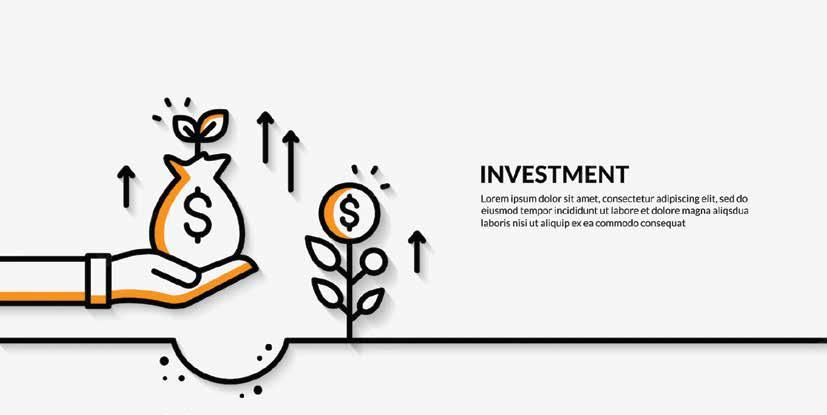
Fortunately, Annan Capital Partners has been at the fore front of supporting multiple SMEs in Ghana and across the African sub-region to access funding for their businesses.
What’s an SME?
It is widely acknowledged that an SME is different from com panies that are primarily used by their owners as vehicles for self-employment.
A business is considered a small- to mid-size organization (SME) if its revenues, assets, or workforce are below a specific threshold.
Unfortunately, there isn't a universally accepted definition of a SME. Each nation is free to choose its own definition and may also opt to impose partic ular restrictions on particular
businesses. The standards for classifying a SME differ between nations and occa sionally between industries.
Small and medium-sized businesses (SMEs), which make up a significant portion of firms in Africa, are the backbone of the global econ omy.
SMEs are thought to account for 90% of the private sector in the developing world and for 80% of jobs on the conti nent of Africa, making them a significant force behind eco nomic progress.
Abor and Quartey (2010) claim that the SME sector makes up the majority of firms in Ghana, accounting for over 92% of all businesses. In addition, it was predicted that in 2018, SMEs contribut ed an estimated 70% of Gha na's Gross Domestic Product (GDP), or around 90% of all enterprises that were in oper ation. Close to 85% of jobs in Ghana are reportedly provid ed by this industry.
investmenttimesonline.com 61 FUNDING OPPORTUNITIES FOR SME’S
It is impossible to overstate the importance of SMEs to the stability of any economy, especially, that of Ghana and the rest of Afri ca.Numerous studies about the primary forward-thinking function that SMEs play in every economy have been conducted in both developed and developing nations.
For these enterprises to grow, create more jobs, and generate economic growth, they need access to funding opportunities.
Funding gateways for SMEs
The owners of SMEs frequently gripe that a lack of funding prevents them from expand ing and fully using lucrative investment pros pects.
The "funding or financing gap" refers to this difference between the financing options available to small and medium-sized busi nesses and the financing they could effec tively employ.
There are quite a lot of potential funding sources for SMEs. However, a lot of them have real-world issues that can make them less beneficial.
The ideal scenario, according to many SMEs, is to never need to raise money; instead, the business would support its own initial start and expand going forward at the rate at which it makes money.
Many SME CEOs who don't want to answer to outside investors find this strategy to their liking. And the successful consequence is typically a stable business with little growth.
Let's begin by exploring some of the funding gateways available to SMEs as they set out to fund their businesses.
Owner, Family & Friends
This is always the first attempt and source of funding for SMEs. Even before receiving external funding, you are typically asked how much of your own resources you initially invested in the business.
Small and medium-sized businesses (SMEs), which make up a significant portion of firms in Africa, are the backbone of the global economy.
Due to the fact that these individuals' (family and friends') motivations for investing may not be solely financial, they may be ready to accept a lower return than many other inves tors, making this a potentially excellent source of funding.
The main drawback is that, for the majority, the ability to raise money from friends and family and on our own is relatively con strained.
Bootstrapping
Bootstrapping is the practice of launching a business using only one's own finances, together with money borrowed or invested from family or friends and revenue from the first few sales.
Self-funded firms do not rely on conventional financing techniques like bank loans, investor money, or crowdfunding. Instead, as the name implies, business owners must "pull them selves up by their bootstraps" by starting with their own money.
Bootstrapping is the best place to start for new businesses, especially if market validation of their goods or services has not yet been completed.
The benefit of this approach is that the SME owner retains total control. Since it shows the owners' faith in and dedication to the compa
A NEW THINKING investmenttimesonline.com 62 FUNDING OPPORTUNITIES FOR SME’S
Angel investors may be relatives or family members, but they are mostly outsiders eager to support start-up businesses with
Some of the angel investor networks in Ghana/Africa includes the following:
• African Business Angels Network
• Ghana Angels Investor Network
Most people undoubtedly picture VC when they think of early-stage financing. Some investors will put money into a new business, while others may wait until it has been oper
A venture capitalist firm is very often a sub sidiary of a company that has significant cash holdings that they need to invest in. The ven ture capital subsidiary is a high-risk, poten tially high-return component of their invest
ny, it might also be used to persuade investors to join.
Angel Funding
Angel investors are people or organizations who make investments in start-ups or early-stage businesses in exchange for an equity ownership interest.

However, securing an angel investor is only half the battle. Once you've connected, you'll need to sell your business to investors.
One drawback is that these people are uncom mon and frequently very picky about what they are willing to invest in.
Once a business angel expresses interest, they can be of considerable assistance to the SME because they frequently possess excellent com mercial judgment and are likely to be connected
These companies invest quite a significant amount of capital into a SME and have already performed market research and gen erated initial sales.
In return, they receive stock in the business, which entitles them to a seat on the board and a voice in its operations. The injected capital may occasionally be set up as a con vertible debt.
A presentation to a venture capitalist must demonstrate how they would be able to "exit," or release their value, after a number of years, as these investors rarely wish to remain invested for the long term.
This is frequently accomplished by either selling the business to a larger firm engaged in the same industry or expanding it to the point where a stock market listing is feasible.
investmenttimesonline.com 63 FUNDING OPPORTUNITIES FOR SME’S
An SME needs a business idea that could generate the high returns a venture investor is looking for in order to get venture capital funding.
Invoice Factoring / Discounting
Invoice factoring is a type of accounts receivable finance that is also known as "fac toring" or "debt factoring". Invoice factoring enables businesses to sell outstand ing invoices (accounts receivable) to a third-party commercial finance compa ny (a factor).
draft. One advantage of these sources of funding, though, is that when a SME expands, their existing receivables will expand as well, increasing the amount they can borrow from their suppliers or through invoice discounting.
Therefore, factoring and/or invoice discounting are two of the extremely limited number of financial sources that expand on their own in tandem with the expansion of the business.
Loans & Bank Finance
ready to offer some type of overdraft as well as long-term loans.
Accessing loans can be chal lenging, particularly when collateral is needed. But thanks to technology, it's now simpler to get unsecured loans through mobile-based services.
Crowdfunding
Here, a business borrows money from an individual, a microfinance organization, or
Self-funded firms do not rely on conventional financing techniques like bank loans, investor money, or crowdfunding. Instead, as the name implies, business owners must "pull themselves up by their boot straps" by starting with their own money
These sources of finance effectively let a company raise finance against the security of their outstand ing receivables.

This funding is only tem porary and frequently costs more than an over
a bank that must be repaid with interest after a certain amount of time.
When a loan can be secured against significant assets like land and buildings, banks may be
Crowdfunding is a method of obtaining outside money from a big audience as opposed to a limited number of special ized investors (such as banks, business angels, or venture capitalists), where each person contributes a small portion of the desired funding.
The contributions are then given a reward by the company, which may take the form of gifts, special offers, or even stock.
When it comes to crowdfunding,
investmenttimesonline.com 64
A NEW THINKING FUNDING OPPORTUNITIES FOR SME’S
individuals provide the funds that the business requires. Crowdfunding typically occurs through specialized networks, particularly the internet, with the business owner outlining the activities and goals of the company, sometimes in the form of a business plan, and asking for funds under a set of rules and regulations.
With regard to traditional types of financing, this constitutes the main novelty of crowdfunding because it allows business owners to access big audiences' savings without the need for a mid dleman like a bank.
Agoo Africa Crowdfunding
Coming highly recommended as an efficient crowdfunding platform for small businesses and start-ups in Africa is the yet to be launched Agoo Africa by Annan Capital Partners.

“Agoo Africa is a crowdfunding platform for African early-stage start-ups’ and small tradi tional businesses.”
“When launched, it will allow owners of such businesses to make their project and their pitch accessible to a large number of investors, from young non-professional business angels to established international funds.”
“On the other hand, any investor can now have access to a curated database of small Ghanaian companies from various sectors and invest in them seamlessly via our platform.”
Another distinguishing feature of Agoo Africa is that, unlike most of the existing equity crowd funding/crowdinvesting platforms, Agoo doesn't require your startup to be incorporated in Delaware. On the contrary, it's the first such platform which clearly encourages fundraising for companies registered in Africa.
investors requires time, especially if they are corporate investors like venture capital ists (VC) and or even angel investors.
Utilize every opportunity you get to inform potential investors about your company, your vision, and what makes it special. This will ensure that they have heard of you and, ideally, are familiar with your narrative when you approach them later to discuss a fundraising effort.
Annan Capital Partners, bringing on board decades of experience in connecting multi ple SMEs across the African region to fund ing opportunities, will be an ideal partner in your quest to fund your SME.
When
to Raise Finance
When you're not in need of funding is the best moment to begin looking. On-boarding new
https://annancapitalpartners.com/
investmenttimesonline.com 65 INVESTMENT TIMES FUNDING OPPORTUNITIES FOR SME’S
About Author
Paul Frimpong, CGIA, ICCE
Paul Frimpong is a development economist, top voice on Sino-Africa relations, and an award-winning entrepreneur.
He’s currently the Global Head of Strategy & Membership at the Institute of Certified Chartered Economists (ICCE).
This article is originally curated for and published by: Annan Capital Partners.
Annan Capital Partners (ACP) is a boutique investment advisory and business development agency offering holistic wealth management and venture building services to a wide range of clients, from entrepreneurs to governments and from local SMEs to global corporations.
py.frimpong90@gmail.com

Understanding the concept of liquidity in banking A NEW THINKING
Ghana’s Startup Ecosystem at a glance
Ghana is becoming one of the most vibrant and developing startup
havens on the continent. The country is finally catching up fast with countries such as Egypt, Kenya, Nigeria, and South Africa as some of the continent’s giants when it comes to startups.
Startups are often seen as businesses that are just start ing out and have the potential to expand quickly. Due to vari ations in setup and vision, we can say that all startups are SMEs, but not all SMEs are startups.
These entrepreneurial endeav ours are often founded by one to three entrepreneurs, who concentrate on creating a mar ketable product, service, or platform in response to a per ceived market need.
Gleaning from continent-wide prospects, Africa is going digi tal as a result of a decade of economic expansion, rapid urbanization, internet penetra tion, and the bankability of its population.
Technological innovation is advancing quickly. Ghana is no exception, as internet pen etration has increased over the past five years.
Ghana is leading the area in technical innovation, and the number and size of digital enterprises are increasing, heralding the arrival of the Fourth Industrial Revolution in the nation (particularly since the onset of the COVID-19 pandemic).
As a result, the number of startups has dramatically increased.
Given that the majority of Ghanaian businesses are informal SMEs that still don't use technology or digital solutions, the startup ecosys tem's potential for innovation and growth in Ghana is still mostly untapped.
Ghana's development is a result of a number of positive factors, including substantial consumer and business mar kets, highly developed entre preneurial skills, and a robust corporate sector.
To succeed, most startups require the ideal combination of networks, financial markets, rules, and culture. Over the past ten years, Ghana has created an environment with a lovely interplay of these elements.
Talent & Government Plans
Talent is one of the key com ponents of any start-up eco system, and Ghana is devel oping a sizable talent pool of future digital leaders.
The Ghana Government in recent years has launched vari ous initiatives aimed at devel oping a robust entrepreneurial and startup ecosystem. For example, to tackle the Ghana government introduced the "National Entrepreneurship and Innovation Plan" (NEIP) in June 2017 as a $10 million program to address the fund ing gap and lower youth unemployment.
The government's main method for aiding start-ups and small businesses is now NEIP
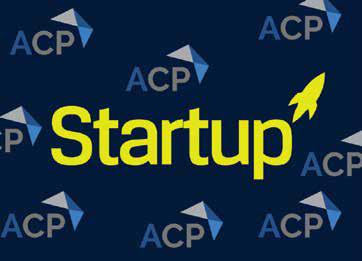
INVESTMENT TIMES investmenttimesonline.com 67
GHANA S STARTUP ECOSYSTEM AT A GLANCE
NEIP has given over 7000 entrepreneurs across ten areas of the country specialized training in entrepreneurship and business development through tech hubs.
Again, it has provided 500 of those 7000 entrepreneurs with some initial money to support their most viable business concepts. Additionally, the government promises to give tax benefits to NEIP participants based on how many workers they employ.
Africa Startup Acts
We are starting to witness momentum in the legislation space across Africa as more coun tries begin to find the middle ground to launch Acts to regulate their startup ecosys tem.
Startup Acts are extensive legislative and reg ulatory frameworks designed to promote entrepreneurship and make it possible for new businesses to develop with strong growth potential, typically by providing spe cific incentives (tax, subsidies, procurement, etc.).
Tunisia, in 2018, paved the way as the first country on the continent to pass the Startup Acts and this has been followed by Senegal in 2020. Other countries such as Rwanda, Mali, Nigeria, Ghana etc. have all activated conver sation to be next in line.
Startups can function with the security pro vided by a defined framework for expansion thanks to legislation. With the help of this legislative mechanism, innovative businesses with high growth potential are formed more quickly.
Startup hubs
We cannot certainly talk about the startup ecosystem without touching base on the availability of strategic organizations such as entrepreneurship hubs, which have become the key and major driver of growth.
Startups and incubator hubs have become inevitable when it comes to startup ideation,
execution, and growth.
Entrepreneurs and startups need a lot of capacity-building and support systems in order to succeed, and that is the critical role played by these entrepreneurship hubs, which are growing across various regions of the country.
While most of these hubs are technologi cally driven, there are equally some of these hubs that are specific to certain niches, such as women's entrepreneurship, students’ entrepreneurship, as well as cov ering multiple sectors to sector agnostic hubs.
Annan Capital Partners is currently build ing a pipeline of critical support systems through their venture building platforms, including crowdfunding setups.
Starting up
There are 1000 and 1 factors deemed criti cal to be considered before launching any business idea. These are mostly universally and globally acceptable factors and are not necessarily applicable to a single country.
It’s fair to say that in venturing into Ghana’s startup space, these would be some of the few key factors to be met.
A great idea
It is obvious that no company can grow if it doesn't have a brilliant idea. The growth of your company will be solely dependent on a brilliant and workable idea.
Additionally, you need to have a distinctive idea that stands out in the market because there are many competing businesses.
Passion
It can come off as naive. But if you're going to focus on making your business idea a reality for the next 12 months, enthusiasm is extremely essential.
If your business venture aligns with your
A N E W T H I N KIN G
investmenttimesonline.com GHANA S STARTUP ECOSYSTEM AT A GLANCE 68
passion, you'll succeed as an entrepreneur. Even if you start anything, if you don't believe in it, you might not be able to stick with it over the long term, regardless of how successful it may be.
It is one of the most crucial things that will enable you to overcome all obstacles and challenges.
You will encounter many dangers and difficul ties during this process, and your optimistic outlook will be the only thing that will keep you alive. To build your own business, you will have to put in a lot of effort.
Funding
The funding of your business is the next crucial component that needs to be taken into account. You must accurately pinpoint the resources from which you will be able to obtain finance for your company.
Additionally, it is preferable to have a plan in place in order to properly manage a compa ny's budget.
In our previous insights, we shared tips on Funding opportunities for startups in Ghana. That article will proof useful as well, as we will soon find out that we cannot discuss the start up ecosystem without bridging the funding gap.
Scalability
It’s important to develop strategies around the scalability of your idea and adequately defend it.
Scalability can be viewed as a company's capacity to expand when faced with a rise in demand for its goods or services and the ease with which its organizational structure and available resources can do so.

Scalability, then, is the ease with which your firm can grow without being restricted by your organizational structure.
The business plan Without a business strategy (plan), no compa ny can grow to its full potential. You can get
guidance and find out if your idea is workable by creating a business plan. You will be able to determine every necessary next step with the aid of a company strategy.
For instance, a crucial component of creating a business plan that many entrepreneurs skip over is competitive study, allowing you to be on guard against new entrants and how to overcome such competitors effectively.
Company Registration
The completion of legal paperwork is a crucial component that must be taken into account. The first stage will be to register your business, and the documentation of this is referred to as business formation documents.
investmenttimesonline.com 69 GHANA S STARTUP ECOSYSTEM AT A GLANCE
It’s a mandatory requirement to get your business registered in Ghana, (Registrar Generals’ Department/Registrar of Compa nies).
Entry barriers
This defines how simple it will be for you to set up, but it also indicates how fierce the competition will be. A low entry barrier industry is frequently overrun with shoddy start-ups. It can be quite challenging to distinguish out in a niche like this.
This will easily become known to you
during the preparation of the business plan.
Opportunities for startup ideas in Ghana abound across all sectors. It’s almost certain that every sector of the Ghanaian economy has room for more business ideas and opportuni ties.
Technology is changing how entrepreneurs can create these opportunities in traditional and new sectors of the Ghanaian economy.
Annan Capital Partners is leading in building a venture support systems for Ghanaian startups, after initiating the yet to be launched Agoo Africa crowdfunding platform.
“Agoo Africa is a crowdfunding platform for African early-stage start-ups’ and small tradi tional businesses.”
“When launched, it will allow owners of such businesses to make their project and their pitch accessible to a large number of investors, from young non-professional business angels to established international funds.”
About
Author
Paul Frimpong, CGIA, ICCE Paul Frimpong is a development economist, top voice on Sino-Africa relations, and an award-winning entrepreneur.
He’s currently the Global Head of Strategy & Membership at the Institute of Certified Char tered Economists (ICCE).
This article is originally curated for and pub lished by: Annan Capital Partners.
Annan Capital Partners (ACP) is a boutique investment advisory and business develop ment agency offering holistic wealth manage ment and venture building services to a wide range of clients, from entrepreneurs to govern ments and from local SMEs to global corpora tions.
https://annancapitalpartners.com/ py.frimpong90@gmail.com

investmenttimesonline.com 70 GHANA’S STARTUP ECOSYSTEM AT A GLANCE
Meet the Library and Information Science trailblazer honoured with the Newcomer of the Year Award at Wikipedia’s annual conference

society’s expectation.”
Dr Nkem, a Nigerian who lives in Ghana, attended the University of Benin, the Univer sity of Ibadan and Abia State University. She holds a BA (English and Literature), MLS and PhD (Library and Information Science). In her current position, she is in charge of training African librarians on how to open up knowl edge through open educational resources (OER), Wikimedia projects and open licens ing as well as how to lead their user commu nities to tell their own stories in online spaces. Her skills include digital preservation, digitisation, natural language processing (NLP), open access and indexing.
IIn
tion, one woman has defied the odds and blazed the trail in a field largely dominated by men. This is none other than Dr Nkem Osuigwe, currently the Director of Human Capacity Develop ment and Training, and the Chair of the Public Library Section of the African Library and Information Associations and Institutions (AfLIA) in Accra, Ghana.
Dr Nkem shares, “In my culture, women could dream, but most women could not aspire to be all they wanted to be, because sometimes there were invisible barriers that kept women down, not because they wanted to but because conforming helped them blend into
Dr Nkem creates powerful connections between the African librarian community and Wikipedia. She started her journey as a volunteer Wikimedian in 2020 upon the real isation that African libraries and librarians were missing on Wikipedia. She went on to organise the first African Librarians Week as part of the Wikimedia Foundation’s bi-annu al #1Lib1Ref (One Librarian, One Reference) campaign, which calls on librarians around the world to add missing references to Wiki pedia. More than 800 African editors partici pated, making 27 800 edits to improve infor mation on Wikipedia. It was this, among other efforts, that led to her being nominat ed for and winning the 2022 Newcomer of the Year Award at the annual Wikimedian of the Year Awards, honouring exceptional volunteers for their contributions to Wikipe dia, Wikimedia projects, and the wider free knowledge movement. The awards form part of the annual conference, Wikimania, where Wikimedia volunteers come together to share experiences and showcase some of the work that they have been undertaking.
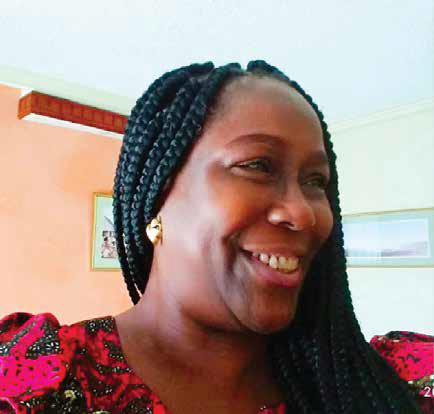
investmenttimesonline.com 70 Meet the Library and Information Science trailblazer
a world where a gender imbalance persists in knowledge management, publishing and research dissemina
“Getting African librarians to believe in the power of telling the true African story through adding citations and editing articles about Africans was amazing. It was a call to action for librarians to go beyond being disseminators of information to information leaders in their different countries, telling the stories of their communities on a global platform,” an elated Dr Nkem said in her accep tance speech.
She has served as the Director of the Nigerian Book Foundation and Anambra State Library Board, in Awka, Nigeria. She has been the Secretary and Chairperson of the Anambra State Chapter of the Nigerian Library Association, and she led the State to win the Best Chapter Award for three consecu tive years. She has also served as a mentor for the International Network of Emerging Library Innova tors (INELI), Sub-Saharan Africa (SSAf) Cohort 1 and 2 and as a coach for the AfLIA Leadership Academy, Cohort 1 and
2. Dr Nkem represents AfLIA on the Management Committee of the UN SDG Book Club’s African chapter. She believes that libraries are the truest democratic institutions in any community, with the power to transform lives as they propel the connec tion of people to knowledge, ideas, skills and opportunities for better living. She is also an advo cate for training librarians to understand the importance of opening up knowledge for greater access and exploring pathways for the integration of Africa’s local content into the global body of knowledge. Dr Nkem is widely travelled and has many publications and conference presentations to her credit. She is married to Prof Andy Osuigwe, a paediatric surgeon.
Dr Nkem’s first experience of the magic of a library was at the tender age of five, when her mother left her with a local librarian to go to the market during a civil war. The impressions she took away with her that day lasted a lifetime and led her to a career working in libraries and with librarians that spans over 35 years. She strongly believes libraries are more than books, and that the power they hold to impact, tell and preserve the history of communi ties remains untapped in Africa.
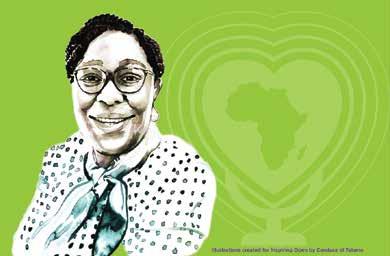
This is the work to which she and the team at AfLIA are dedicated to ensuring equitable access to infor
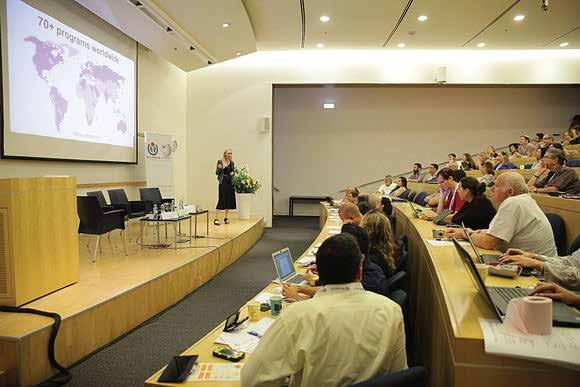
mation and knowledge for all. Dr Nkem also appreciates the challenges that exist in Africa around digitising libraries and ensuring that information is not lost and becomes more accessible to all.
She is a strong believer in the following causes: Arts and Culture; Children’s Rights; Civil Rights and Social Action; Eco nomic Empowerment; Education; Human Rights; Politics; Poverty Alleviation; and Social Services. For a woman who has risen to prominence against all odds, not even the sky can be the limit.
The issues contributing to this gender gap are likely multi-fold, with reasons cited that woman can tend to have less leisure time than men, to an editing culture on Wikipedia that is not always conducive to newcomers...
investmenttimesonline.com 70 Meet the Library and Information Science trailblazer
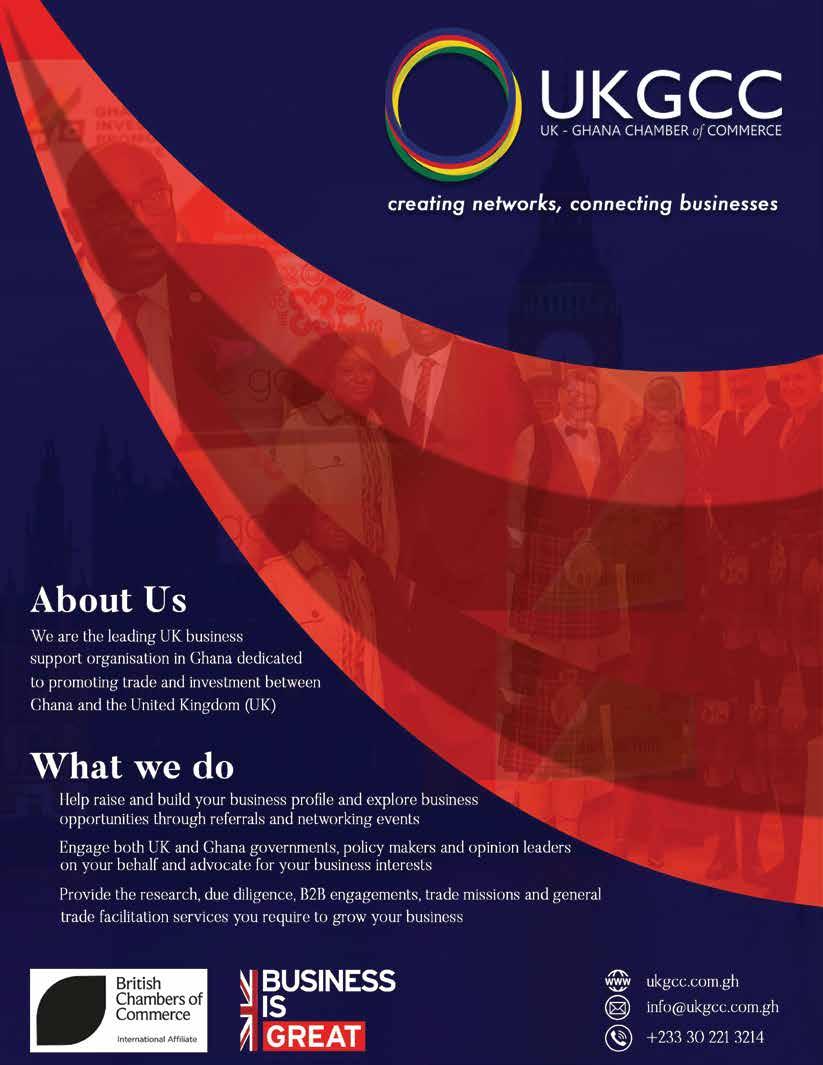
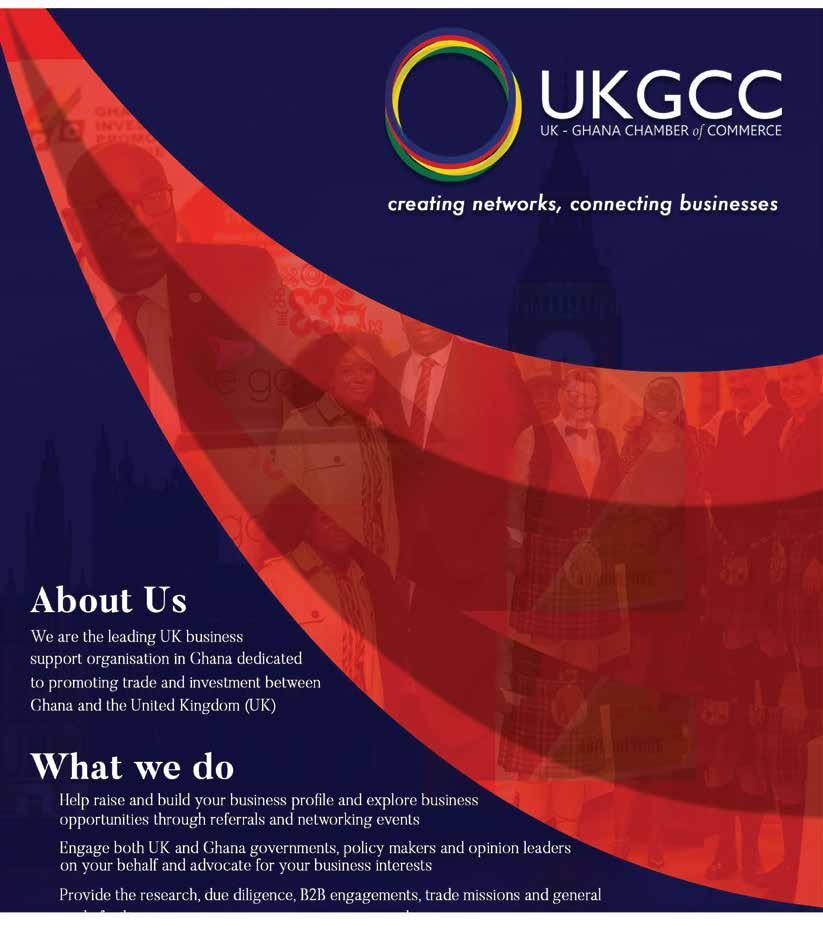
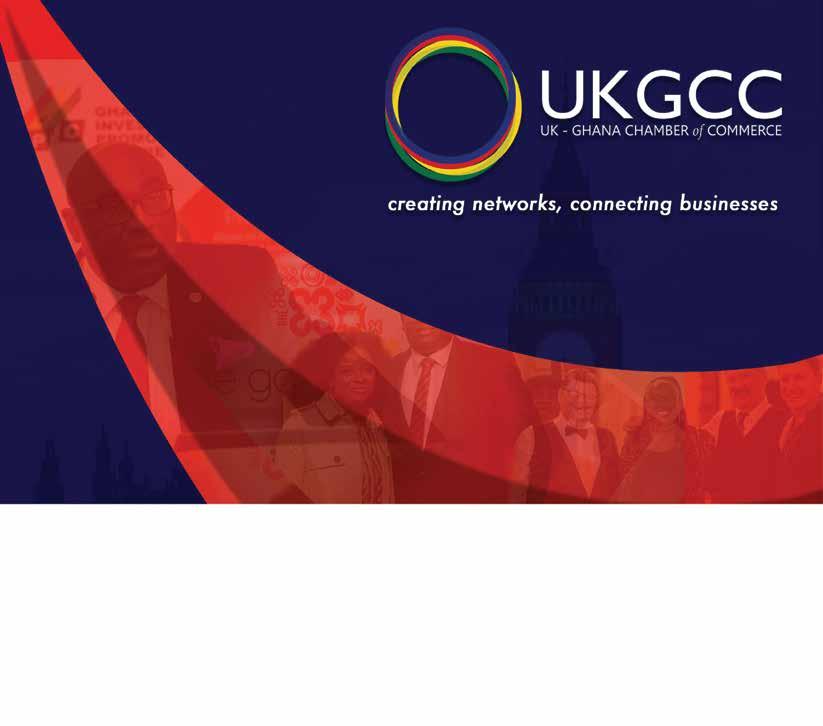



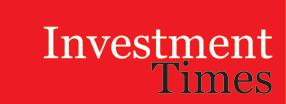
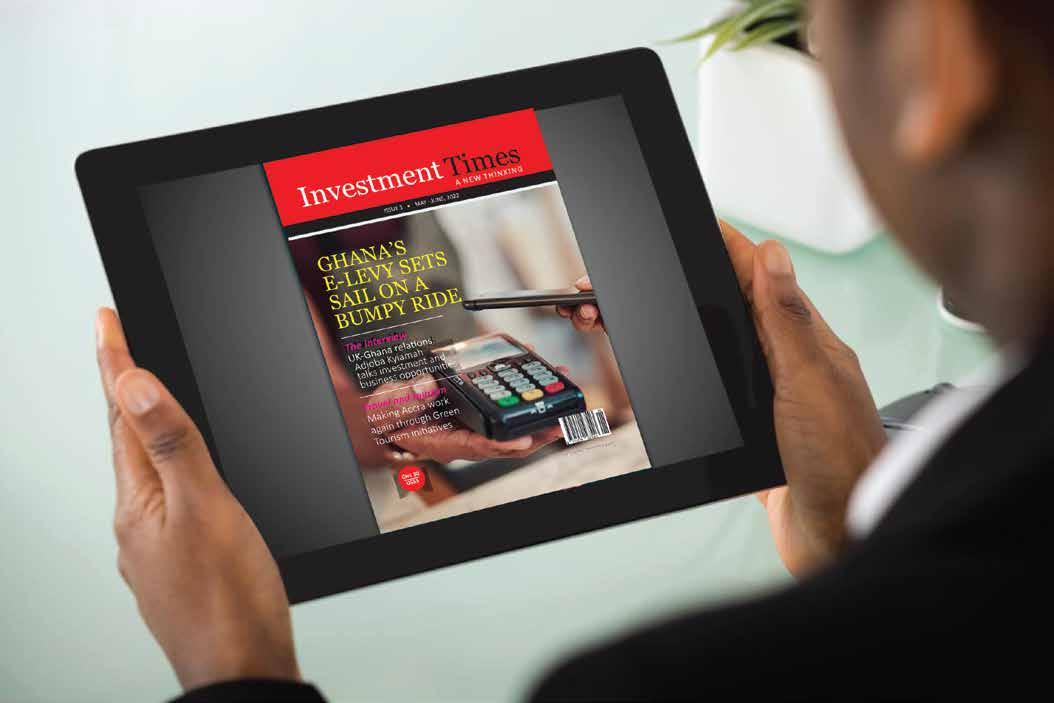
PHONE +233 54 551 6133 MAIL info@investmentimesonline.com ADDRESS Plot 91 Baatsona | Spintex - Accra investmenttimesonline.com Visit our website for more news
Investment Times Magazine is a monthly publication that seeks to provide credible and relevant business information to the African business communi ty as well as investors.
























 By Kestér Kenn Klomegâh
By Kestér Kenn Klomegâh












 By Godswill O. Erondu
By Godswill O. Erondu










 By Baptista S. H.Gebu (Mrs.)
By Baptista S. H.Gebu (Mrs.)

































 By Kestér Kenn Klomegâh
By Kestér Kenn Klomegâh




















 Authors Philip Gyebu
Authors Philip Gyebu




















